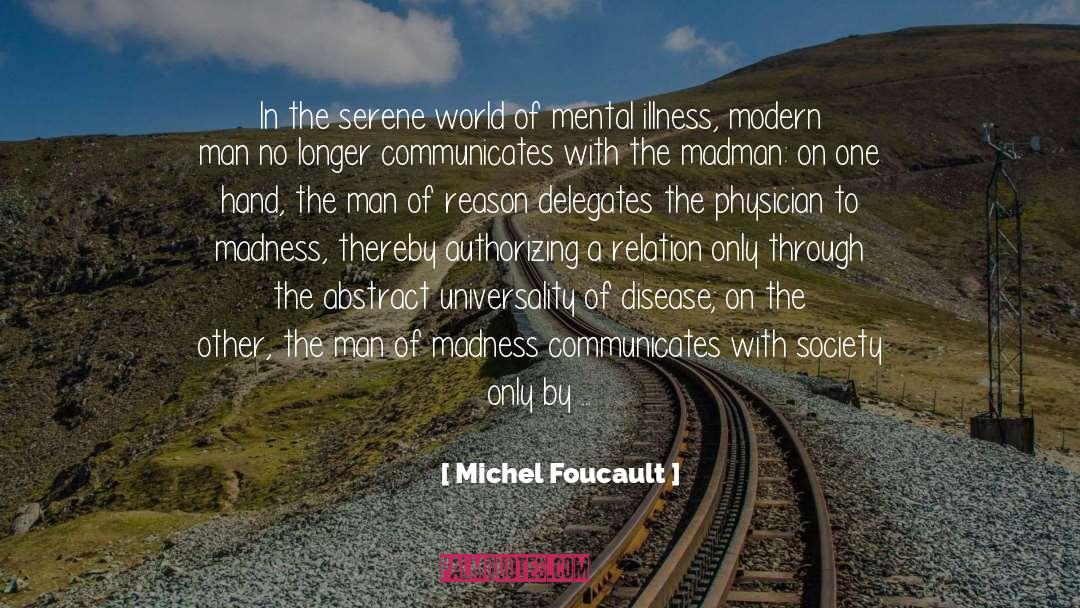Michel Foucault Famous Quotes
Reading Michel Foucault quotes, download and share images of famous quotes by Michel Foucault. Righ click to see or save pictures of Michel Foucault quotes that you can use as your wallpaper for free.
[T]ruly to escape Hegel involves an exact appreciation of the price we have to pay to detach ourselves from him. It assumes that we are aware of the extent to which Hegel, insidiously perhaps, is close to us; it implies a knowledge, in that which permits us to think against Hegel, of that which remains Hegelian. We have to determine the extent to which our anti-Hegelianism is possibly one of his tricks directed against us, at the end of which he stands, motionless, waiting for us.
![Michel Foucault Quotes: [T]ruly to escape Hegel involves Michel Foucault Quotes: [T]ruly to escape Hegel involves](https://palmquotes.com/author/michel-foucault-quotes-793619.jpg)
[Knowledge is governed not by] a theory of knowledge, but by a theory of discursive practice.
![Michel Foucault Quotes: [Knowledge is governed not by] Michel Foucault Quotes: [Knowledge is governed not by]](https://palmquotes.com/author/michel-foucault-quotes-583047.jpg)
And more than once in the course of time, the same theme reappears: among the mystics of the fifteenth century, it has become the motif of the soul as a skiff, abandoned on the infinite sea of desires, in the sterile field of cares and ignorance, among the mirages of knowledge, amid the unreason of the world - a craft at the mercy of the sea's great madness, unless it throws out a solid anchor, faith, or raises its spiritual sails so that the breath of God may bring it to port.
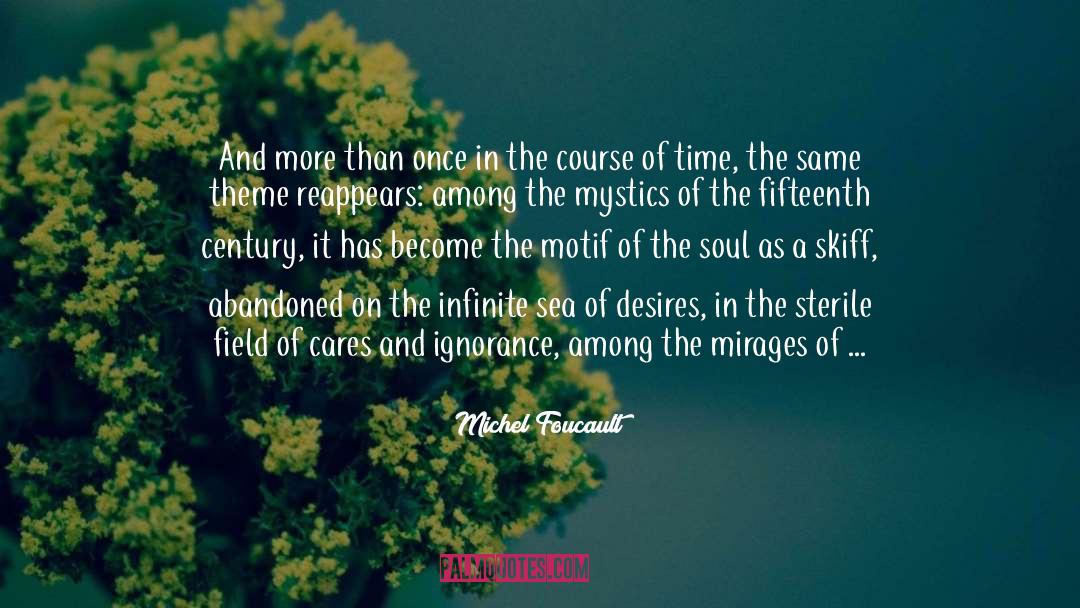
The preferred medications were those that forestalled corruption. We know 'as a result of more than three thousand years of experience that Myrrh and Aloes preserve corpses.' (Lange, 1689) Are not these deteriorations of the bodies of the same nature as those that accompany the diseases of the humors?

Prefer what is positive and multiple, difference over uniformity, flows over unities, mobile arrangements over systems. Believe that what is productive is not sedentary but nomadic.
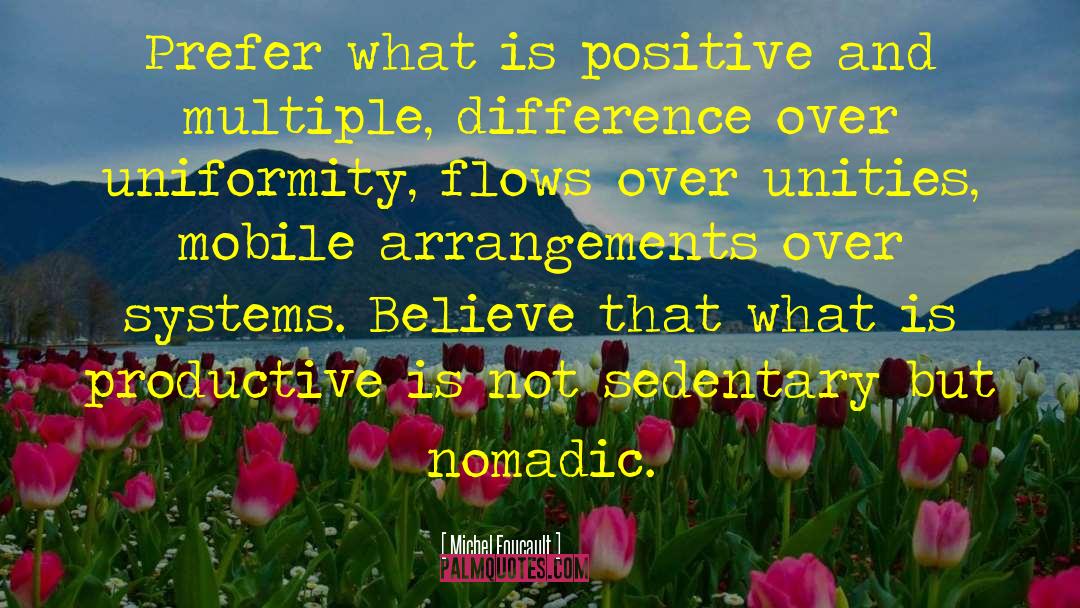
We are entering the age of the infinite examination and of compulsory objectification.

Politics and the economy are not things that exist, or illusions, or ideologies. They are things that do not exist and yet which are inscribed in reality and fall under a regime of truth dividing the true and the false.
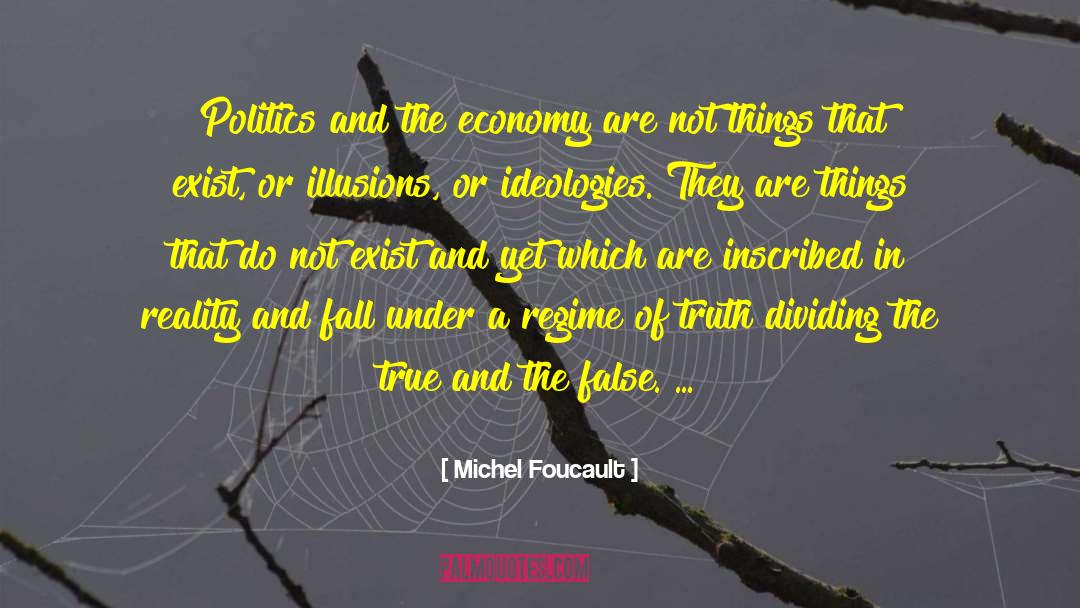
If those arrangements [the fundamental arrangements of knowledge] were to disappear as they appeared ... then one can certainly wager that man would be erased, like a face drawn in sand at the edge of the sea.
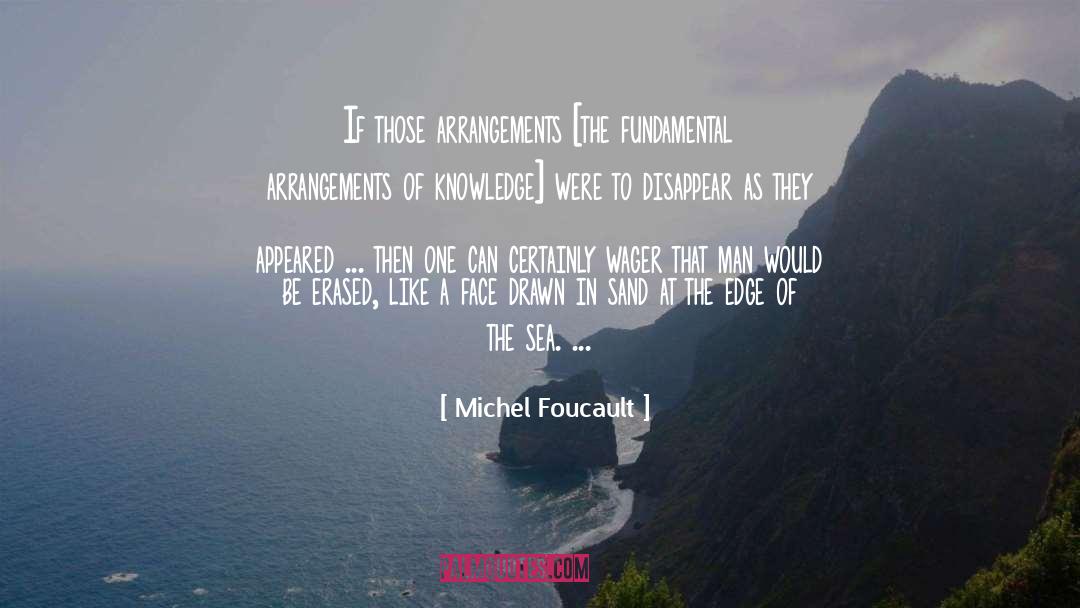
Take the notion of tradition: it is intended to give a special temporal status to a group of phenomena that are both successive and identical (or at least similar); it makes it possible to rethink the dispersion of history in the form of the same; it allows a reduction of the difference proper to every beginning, in order to pursue without discontinuity the endless search for origin.
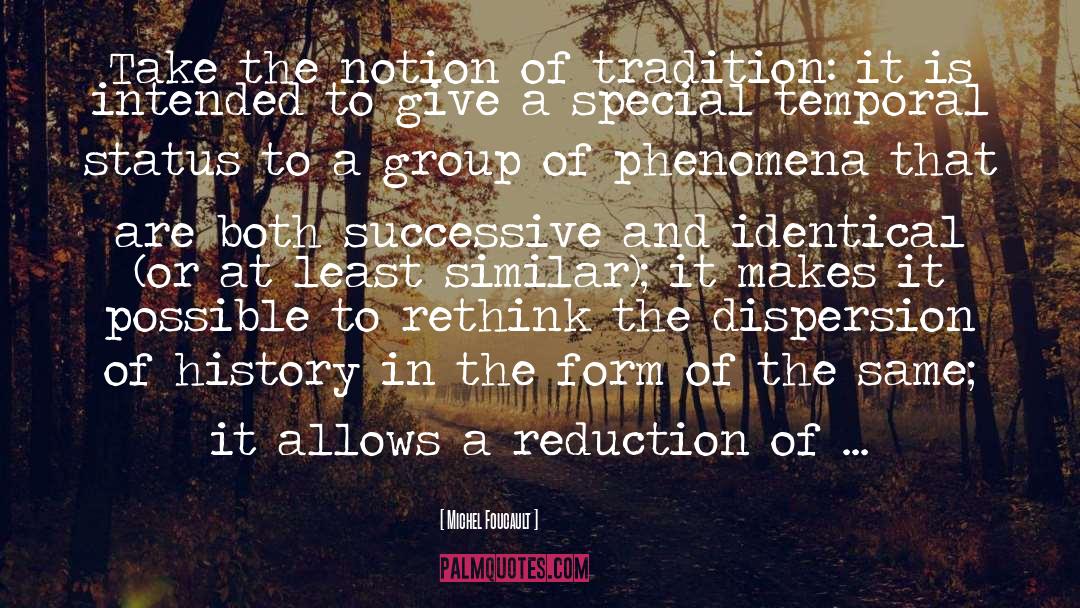
But let there be no misunderstanding: it is not that a real man, the object of knowledge, philosophical reflection or technological intervention, has been substituted for the soul, the illusion of theologians. The man described for us, whom we are invited to free, is already in himself the effect of a subjection more profound than himself. A 'soul' inhabits him and brings him to existence, which is itself a factor in the mastery that power exercises over the body. The soul is the effect and instrument of a political anatomy; the soul is the prison of the body.
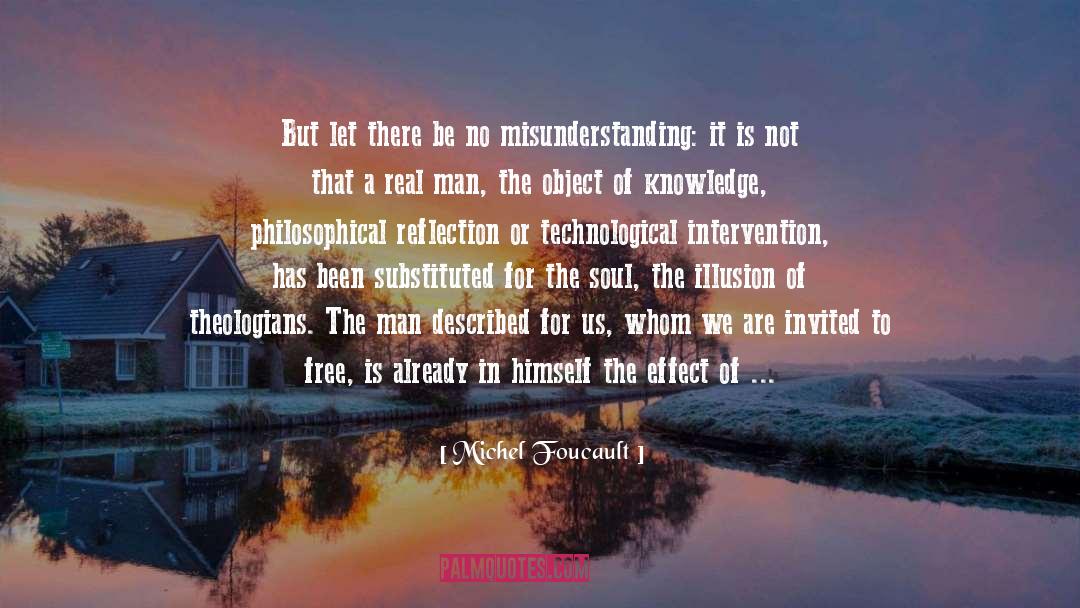
Let us ask ... how things work at the level of on-going subjugation, at the level of those continuous and uninterrupted processes which subject our bodies, govern our gestures, dictate our behaviors, etc ... we should try to discover how it is that subjects are gradually, progressively, really and materially constituted through a multiplicity of organisms, forces, energies, materials, desires, thoughts, etc. We should try to grasp subjection in its material instance as a constitution of subjects.
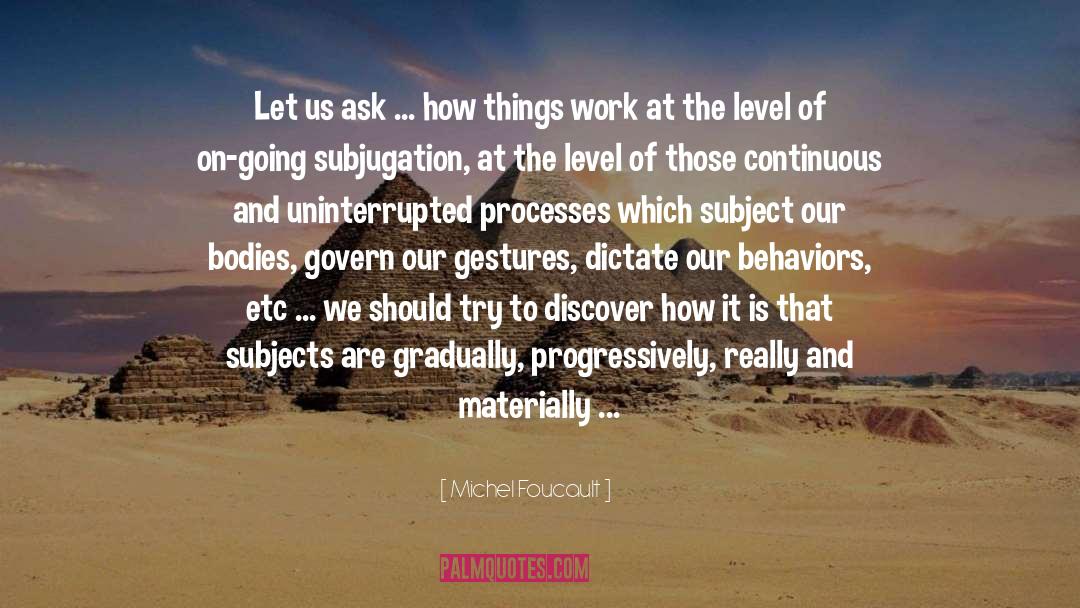
For was this transformation of sex into discourse not governed by the endeavor to expel from reality the forms of sexuality that were not amenable to the strict economy of reproduction: to say no to unproductive activities, to banish casual pleasures, to reduce or exclude practices whose object was not procreation?
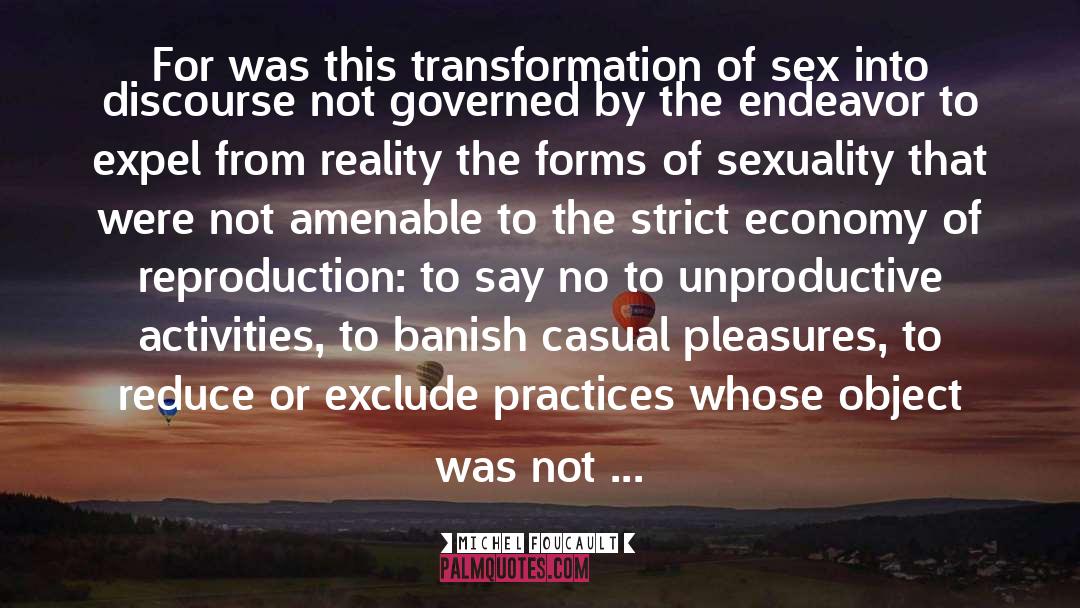
But the guilty person is only one of the targets of punishment. For punishment is directed above all at others, at all the potentially guilty.
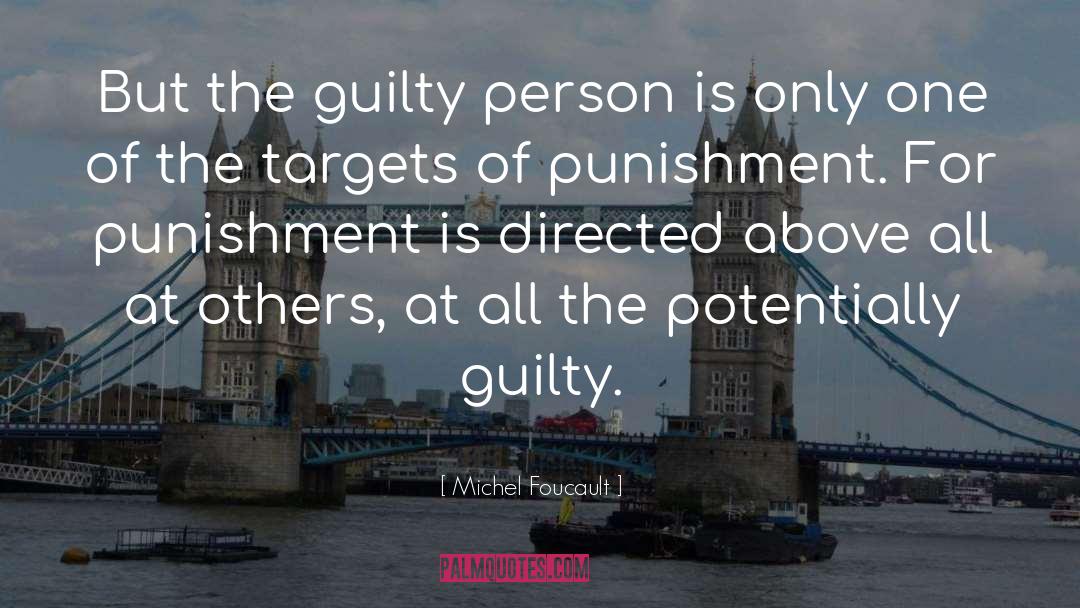
We should not forget that before being inscribed in Western consciousness as the principle of quantification, harmony, and classical non-existence, Greek measurement was an immense social and polymorphous practice of assessment, quantification, establishing equivalences, and the search for appropriate proportions and distributions.
We can see how introducing measure is linked to a whole problem of peasant indebtedness, the transfer of agricultural properties, the settlement of debts, equivalence between foodstuff or manufactured objects, urbanization, and the establishment of a State form.
The institution of money appears at the heart of this practice of measurement.
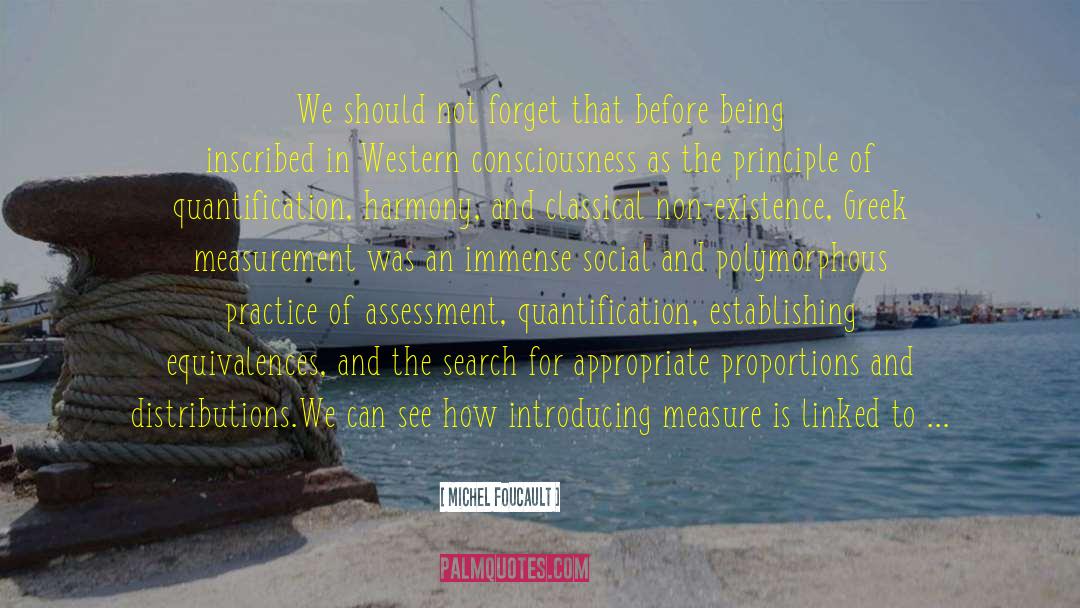
There are more ideas on earth than intellectuals imagine. And these ideas are more active, stronger, more resistant, more passionate than "politicians" think. We have to be there at the birth of ideas, the bursting outward of their force: not in books expressing them, but in events manifesting this force, in struggles carried on around ideas, for or against them. Ideas do not rule the world. But it is because the world has ideas (and because it constantly produces them) that it is not passively ruled by those who are its leaders or those who would like to teach it, once and for all, what it must think.
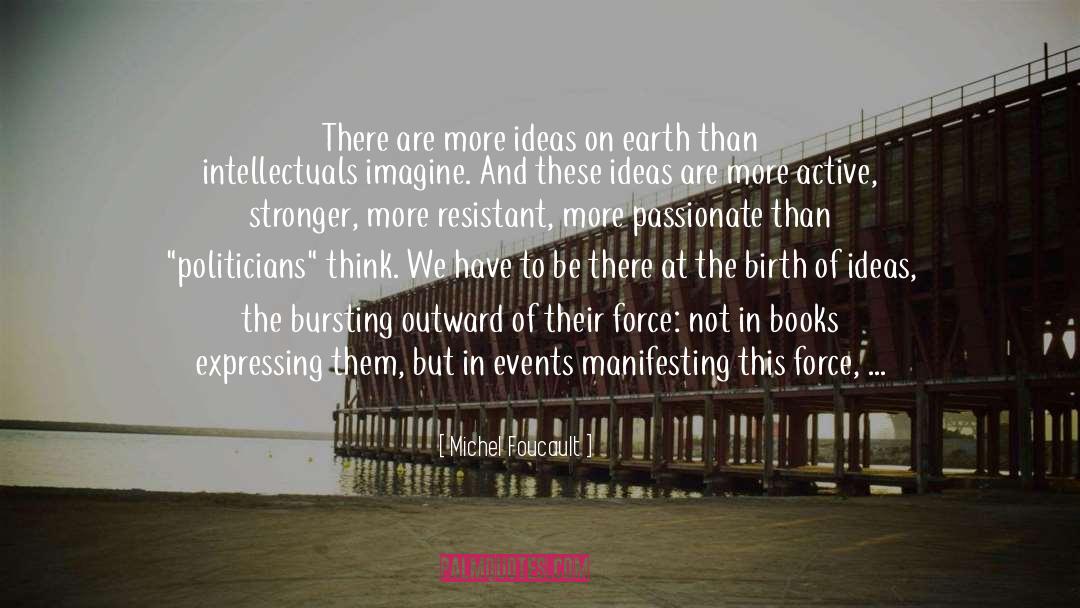
Truth is undoubtedly the sort of error that cannot be refuted because it was hardened into an unalterable form in the long baking process of history
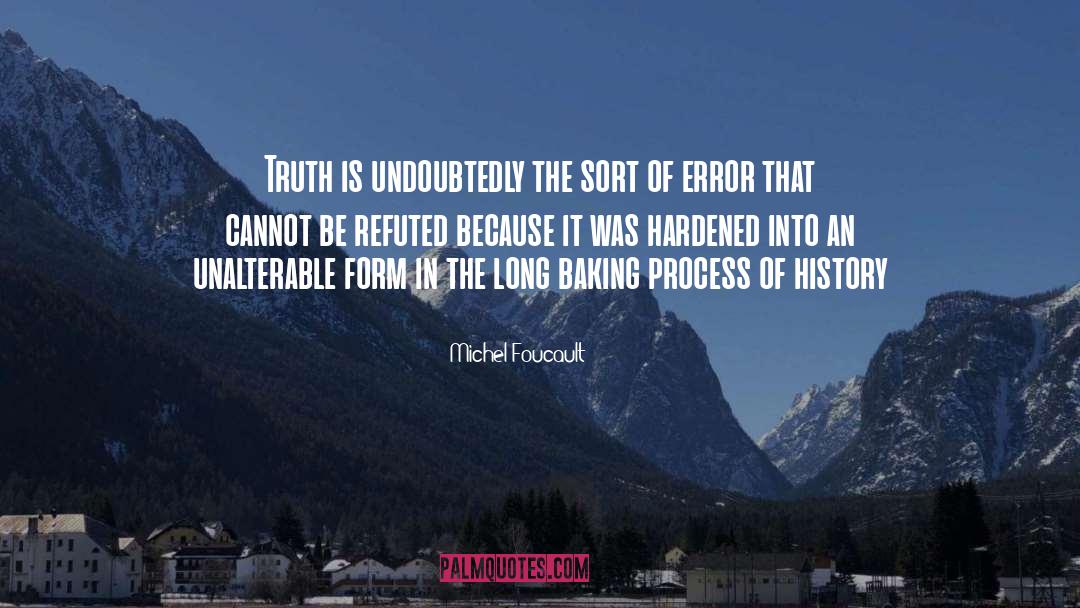
The great hospitals, houses of confinement, establishments of religion and public order, of assistance and punishment, of governmental charity and welfare measures, are a phenomenon of the classical period:
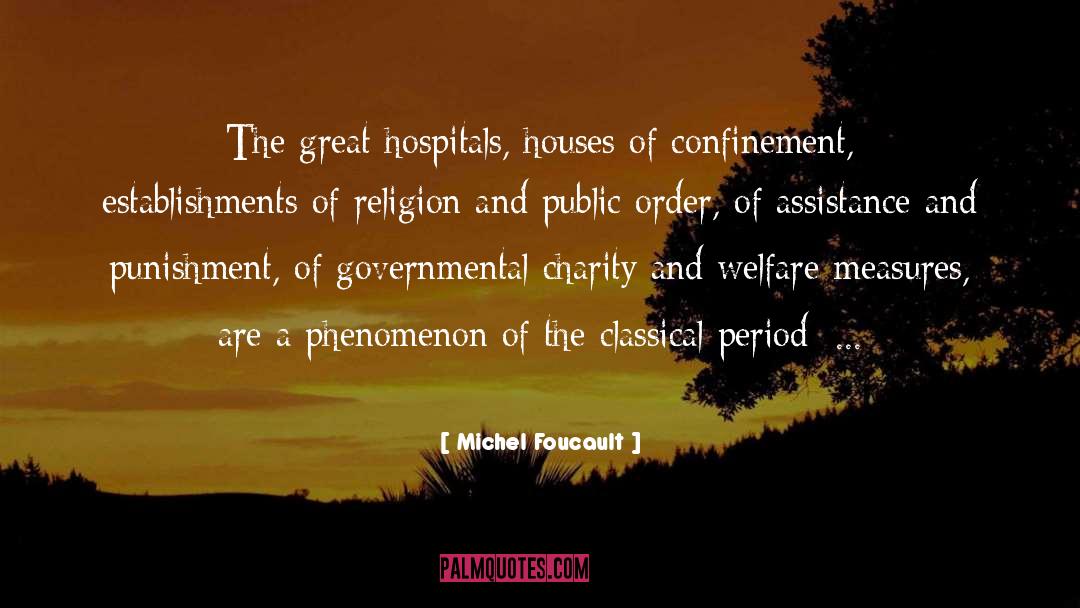
Rusche and Kirchheimer relate the different systems of punishment with the systems of production within which they operate: thus, in a slave economy, punitive mechanisms serve to provide an additional labour force
and to constitute a body of 'civil' slaves in addition to those provided by war or trading; with feudalism, at a time when money and production were still at an early stage of development, we find a sudden increase in corporal punishments
the body being in most cases the only property accessible; the penitentiary (the Hopital General, the Spinhuis or the Rasphuis), forced labour and the prison factory appear with the development of the mercantile economy. But the industrial system requires a free market in labour and, in the nineteenth century, the role of forced labour in the mechanisms of punishment diminishes accordingly and 'corrective' detention takes its place.
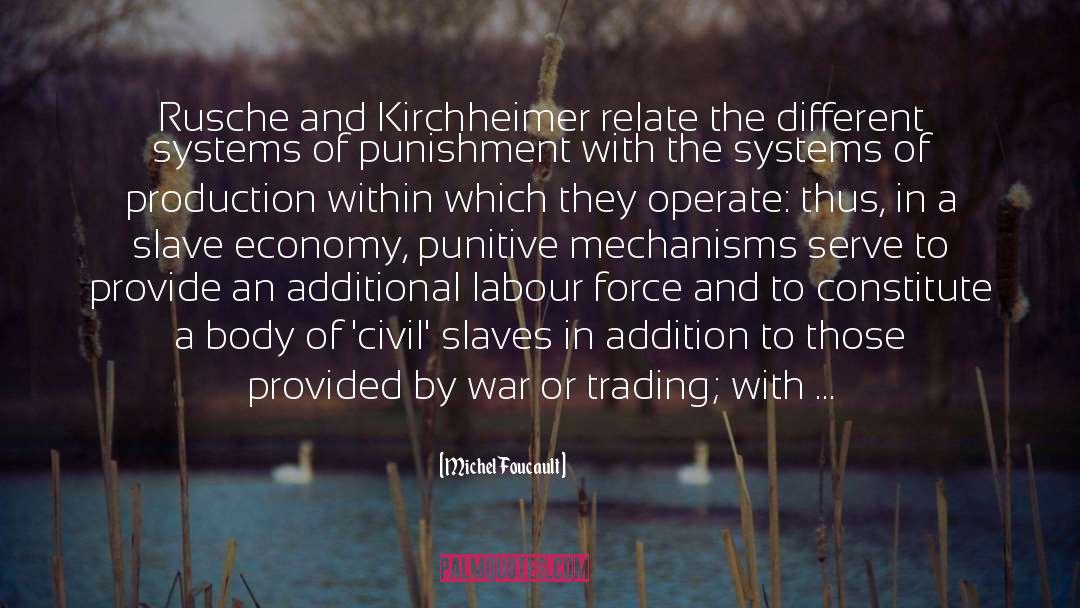
My point is not that everything is bad, but that everything is dangerous.
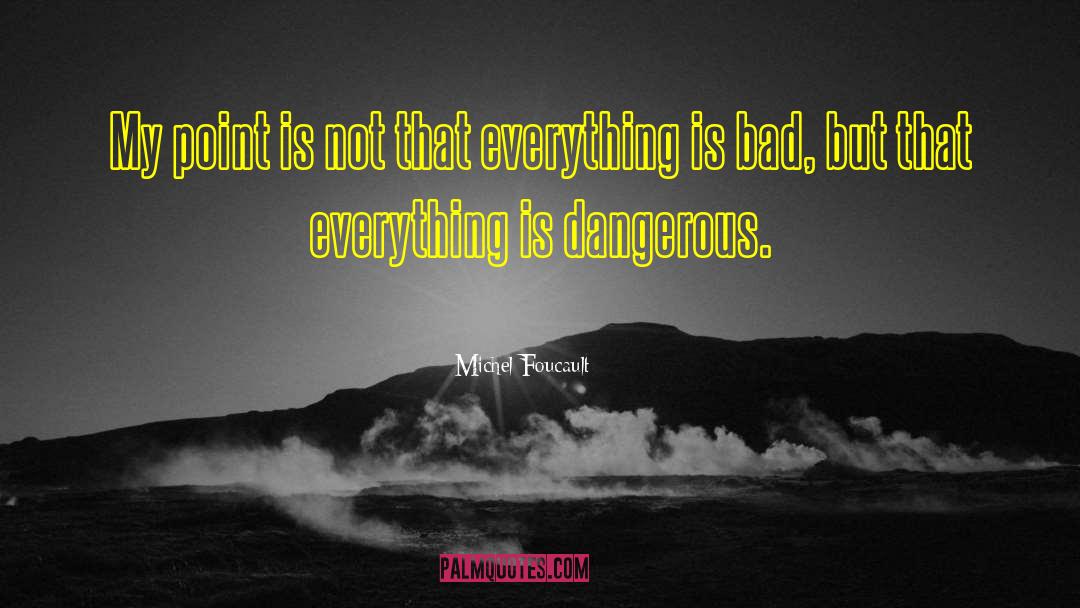
As the archeology of our thought easily shows, man is an invention of recent date. And one perhaps nearing its end.
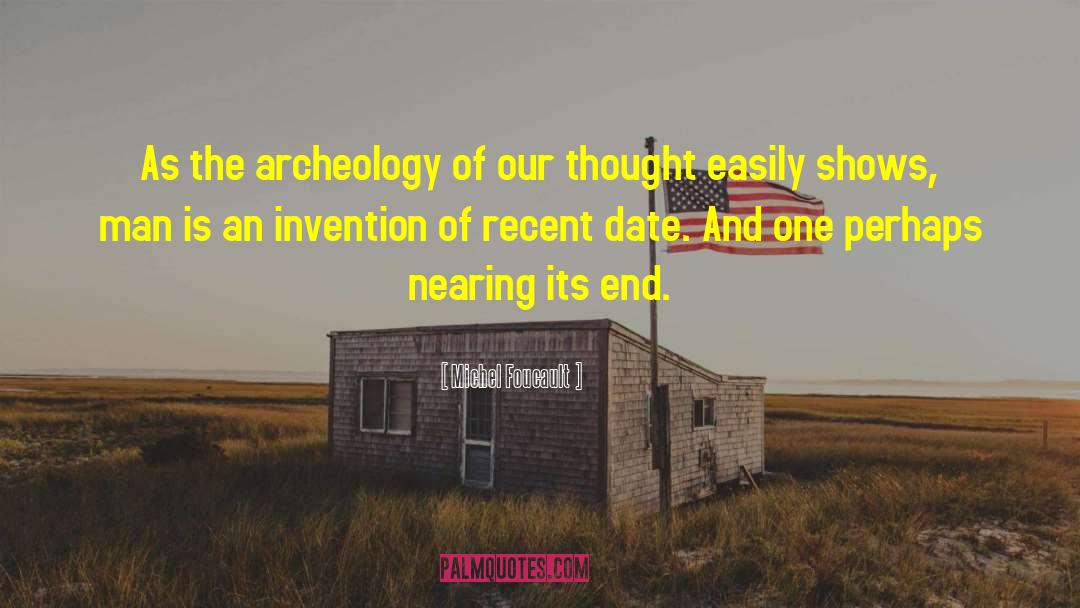
But a punishment like forced labour or even imprisonment – mere loss of liberty – has never functioned without a certain additional element of punishment that certainly concerns the body itself: rationing of food, sexual deprivation, corporal punishment, solitary confinement … There remains, therefore, a trace of 'torture' in the modern mechanisms of criminal justice – a trace that has not been entirely overcome, but which is enveloped, increasingly, by the non-corporal nature of the penal system
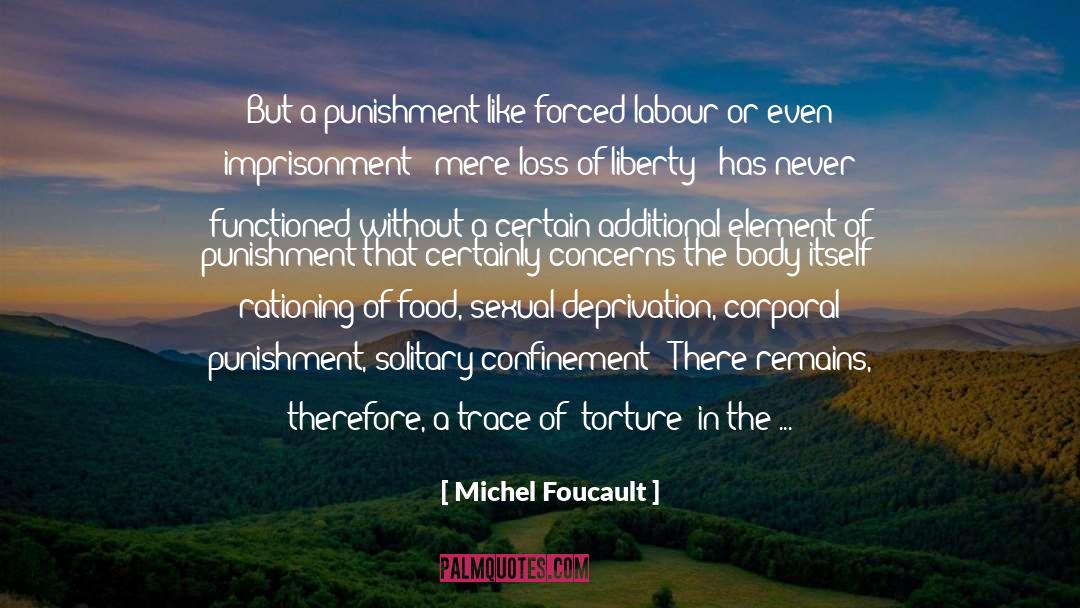
Q: Doesn't this open up the possibility of overcoming the dualism of political struggles that eternally feed on the opposition between the state, on the one hand, and revolution, on the other? Doesn't it indicate a wider field of conflicts than that where the adversary is the state?
Foucault: I would say that the state consists in the codification of a whole number of power relations that render its functioning possible, and that revolution is a different type of codification of the same relations.
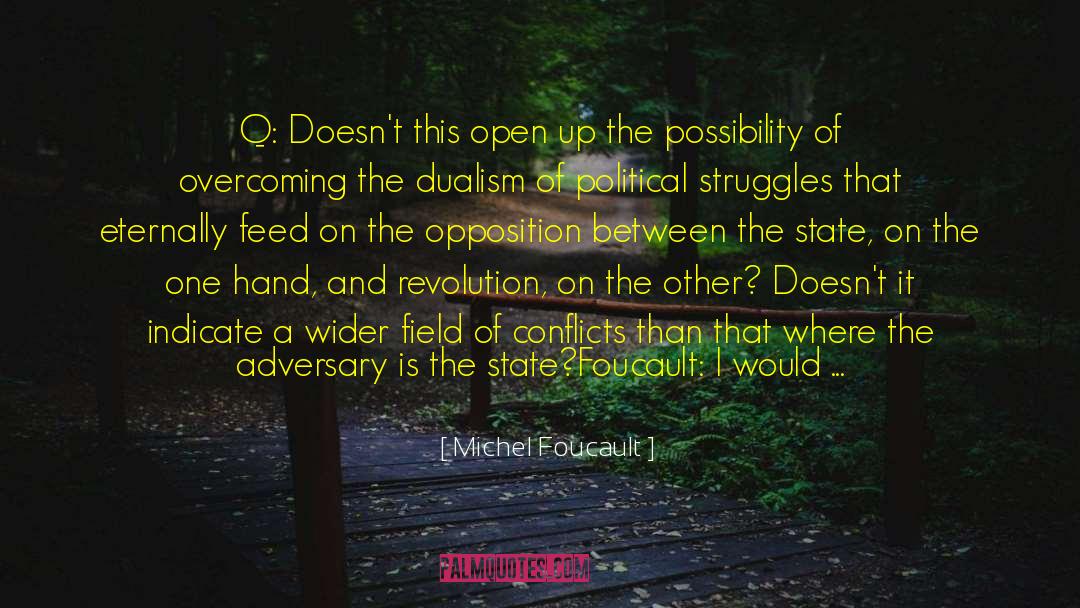
The truth is quite the contrary: the author is not an indefinite source of significations which fill a work; the author does not precede the works, he is a certain functional principle by which, in our culture, one limits, excludes, and chooses; in short, by which one impedes the free circulation, the free manipulation, the free composition, decomposition, and recomposition of fiction. In fact, if we are accustomed to presenting the author as a genius, as a perpetual surging of invention, it is because, in reality, we make him function in exactly the opposite fashion. One can say that the author is an ideological product, since we represent him as the opposite of his historically real function. (When a historically given function is represented in a figure that inverse is, one has an ideological production). The author is therefore the ideological figure by which one marks the manner in which we fear the proliferation of meaning.
In saying this, I seem to call for a form of culture in which fiction would not be limited by the figure of the author…

Wars are no longer waged in the name of a sovereign who must be defended; they are waged on behalf of the existence of everyone; entire populations are mobilized for the purpose of wholesale slaughter in the name of life necessity: massacres have become vital.
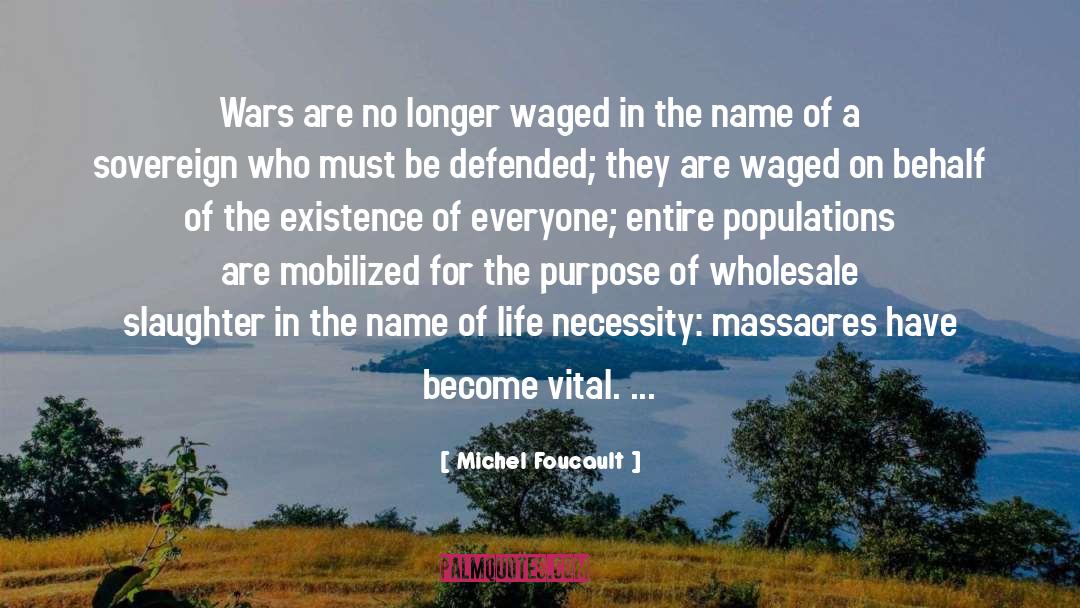
Exercise is the technique by which one imposes on the body tasks that are both repetitive and different, but always graduated. By bending behavior towards a terminal state, exercise makes possible a perpetual characterization of the individual ... It thus assures, in the form of continuity and constraint, a growth, an observation, a qualification.
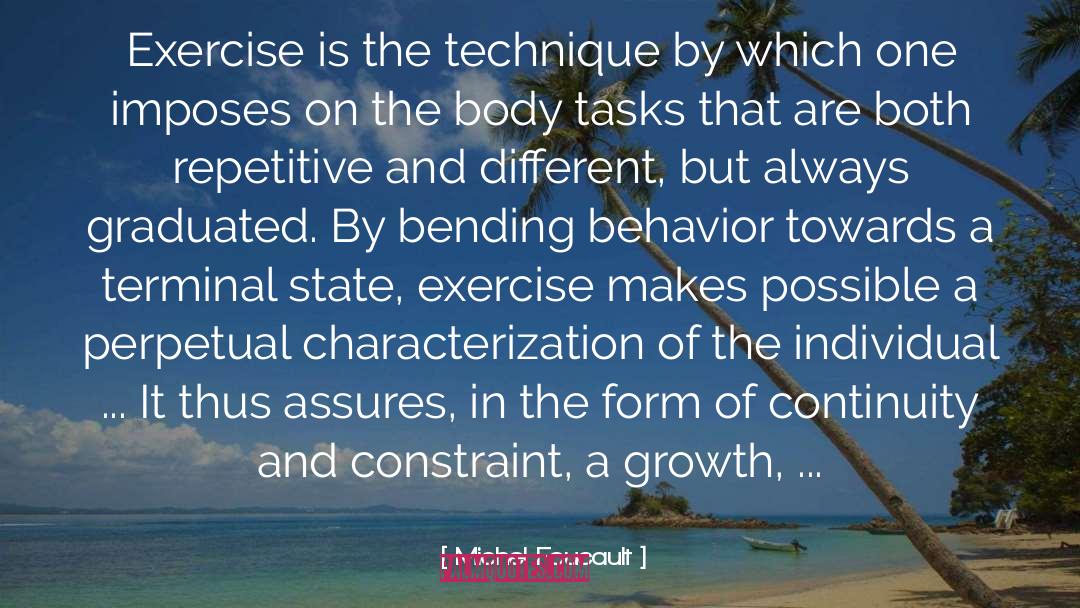
I have not tried to write the history of that language, but rather the archaeology of that silence.
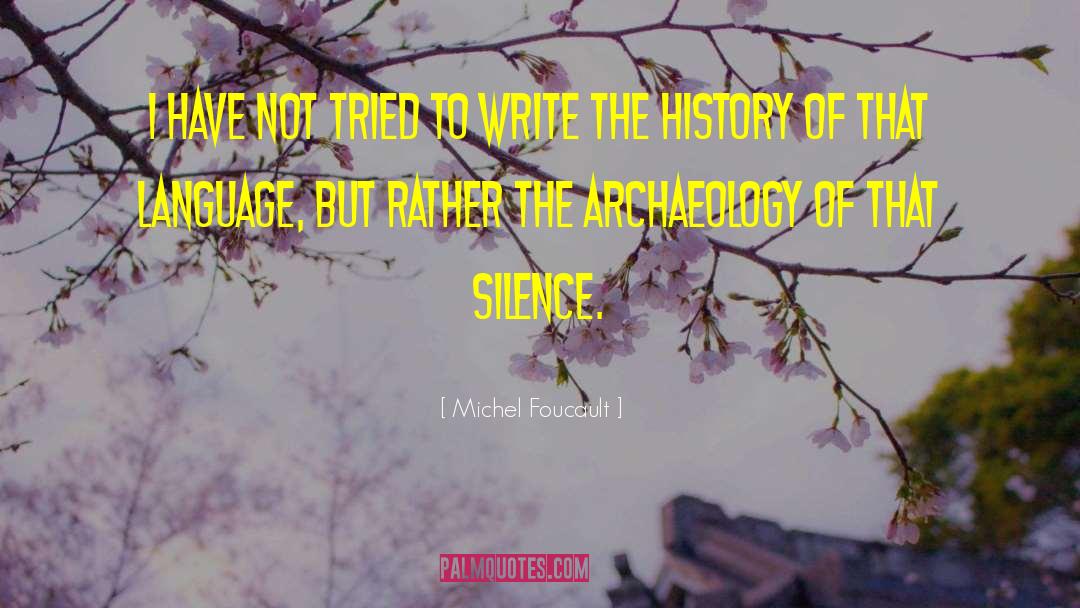
Nature, keeping only useless secrets, had placed within reach and in sight of human beings the things it was necessary for them to know.
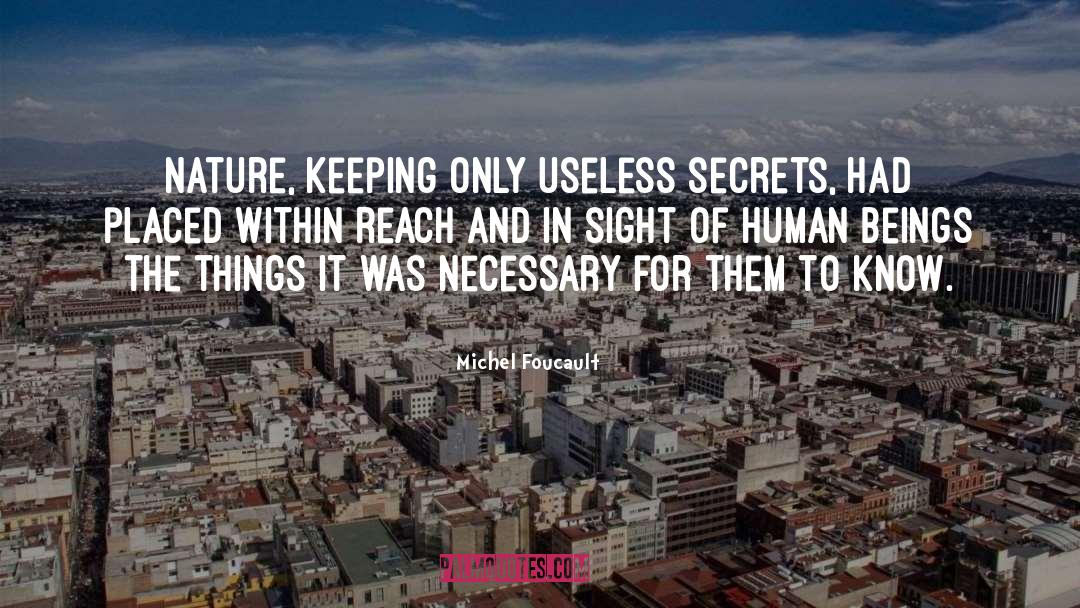
When man deploys the arbitrary nature of his madness, he confronts the dark necessity of the world; the animal that haunts his nightmares and his nights of privation is his own nature, which will lay bare hell's pitiless truth.

It [Iranian Islamic Revolution] is perhaps the first great insurrection against global systems, the form of revolt that is the most modern and the most insane.
![Michel Foucault Quotes: It [Iranian Islamic Revolution] is Michel Foucault Quotes: It [Iranian Islamic Revolution] is](https://palmquotes.com/author/michel-foucault-quotes-1144292.jpg)
But the punishment-body relation is not the same as it was in the torture during public executions. The body now serves as an instrument or intermediary: if one intervenes upon it to imprison it, or to make it work, it is in order to deprive the individual of a liberty that is regarded both as a right and as property. The body, according to this penality, is caught up in a system of constraints and privations, obligations and prohibitions. Physical pain, the pain of the body itself, is no longer the constituent element of the penalty. From being an art of unbearable sensations punishment has become an economy of suspended rights.
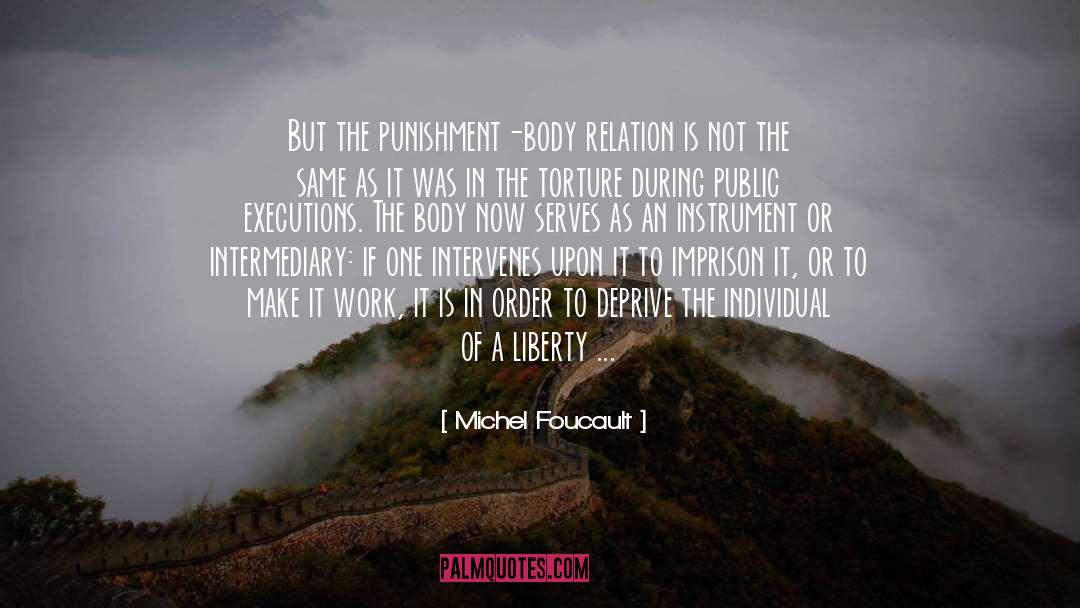
Power is not an institution, and not a structure; neither is it a certain strength we are endowed with; it is the name that one attributes to a complex strategical situation in a particular society.
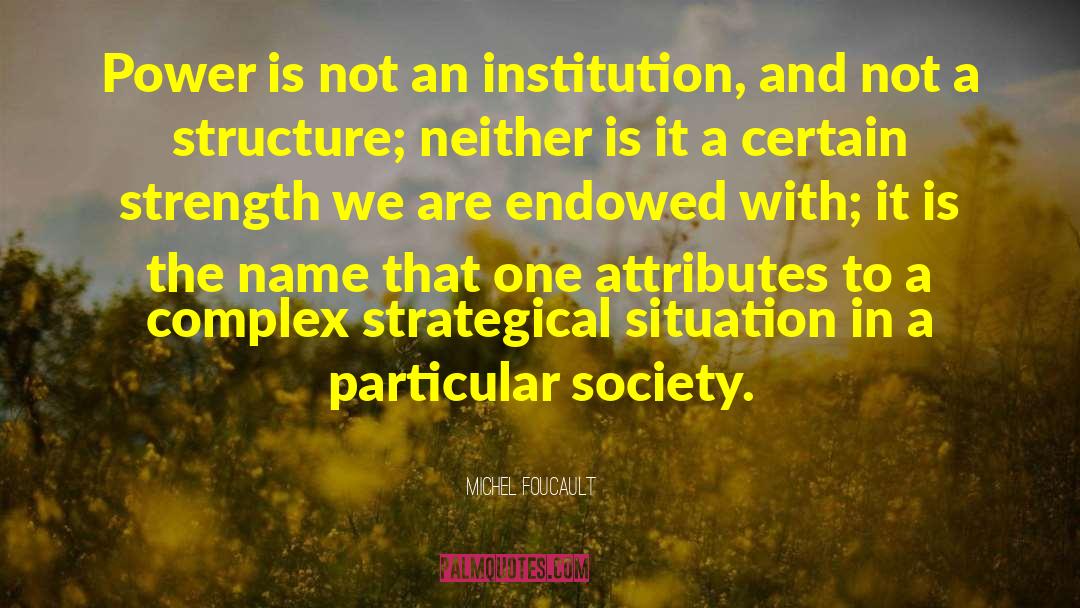
How could the disciplines and the power that functions in them appear arbitrary, when they merely operate the mechanisms of justice itself, even with a view to mitigating their intensity?

Discipline 'makes' individuals; it is the specific technique of a power that regards individuals both as objects and as instruments of its exercise. It is not a triumphant power...it is a modest, suspicious power, which functions as a calculated, but permanent economy.
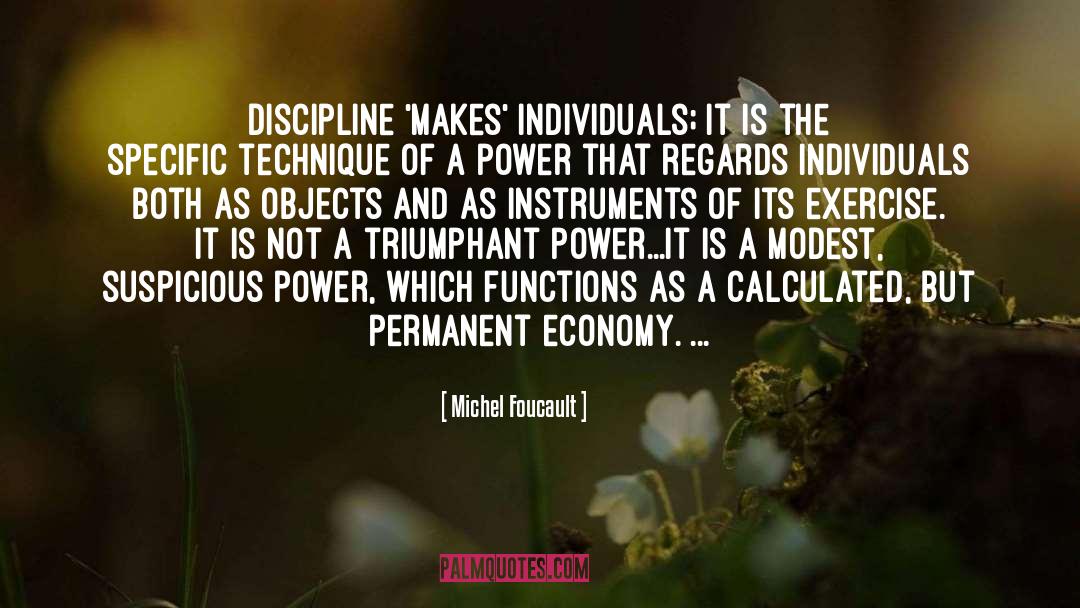
People will be surprised at the eagerness with which we went about
pretending to rouse from its slumber a sexuality which everything-our discourses, our customs, our institutions, our regulations, our knowledges-was busy producing in the light of day and broadcasting to noisy accompaniment.
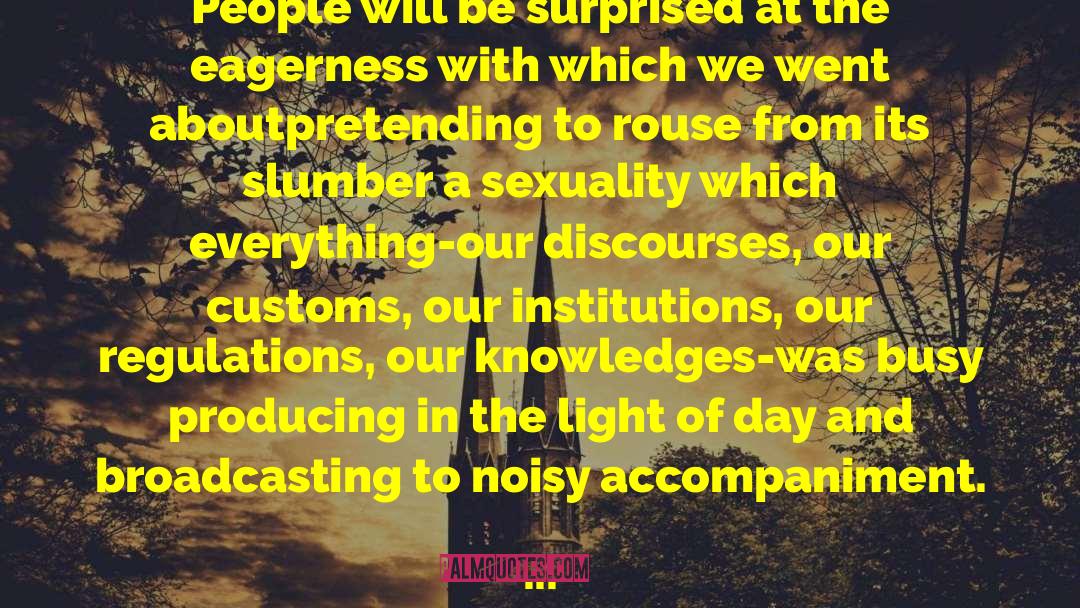
The manifest discourse, therefore, is really no more than the repressive presence of what it does not say; and this 'not-said' is a hollow that undermines from within all that is said.
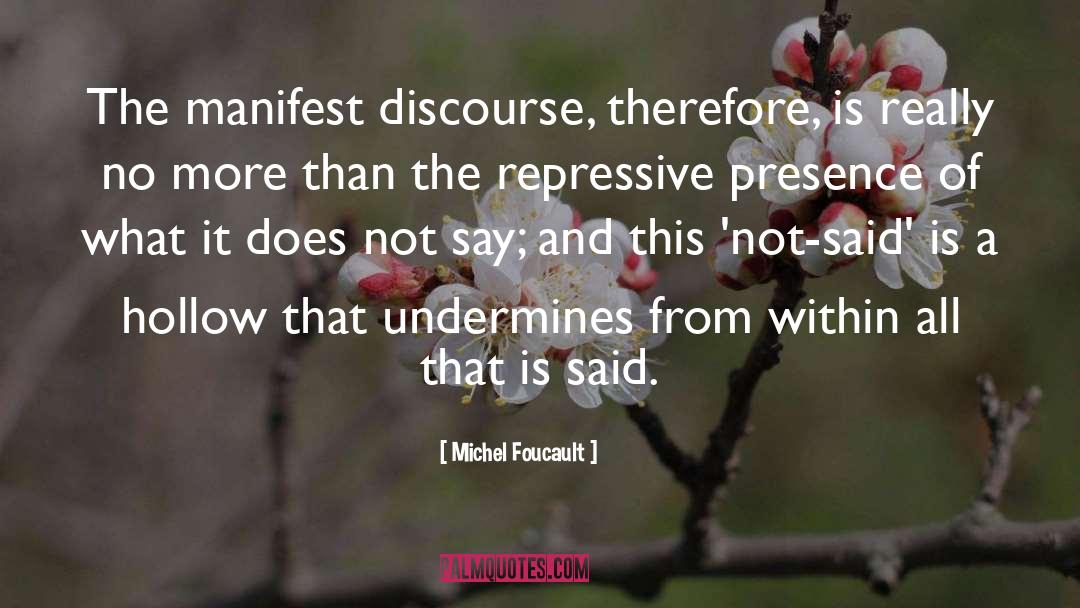
I'm very proud that some people think that I'm a danger for the intellectual health of students. When people start thinking of health in intellectual activities, I think there is something wrong. In their opinion I am a dangerous man, since I am a crypto-Marxist, an irrationalist, a nihilist.

We must cease once and for all to describe the effects of power in negative terms, it 'excludes', it 'represses'... in fact power produces, it produces reality, it produces domains of objects and rituals of truth.
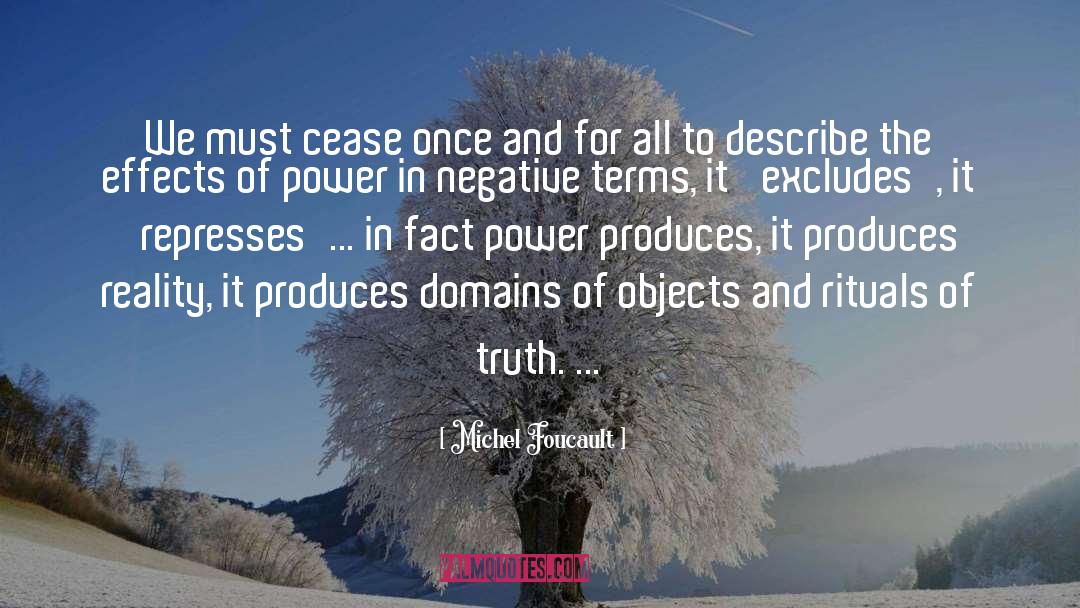
Hermann Boerhaave still defined melancholia as merely "a long persistent delirium without fever, during which the sufferer is obsessed by only one thought.
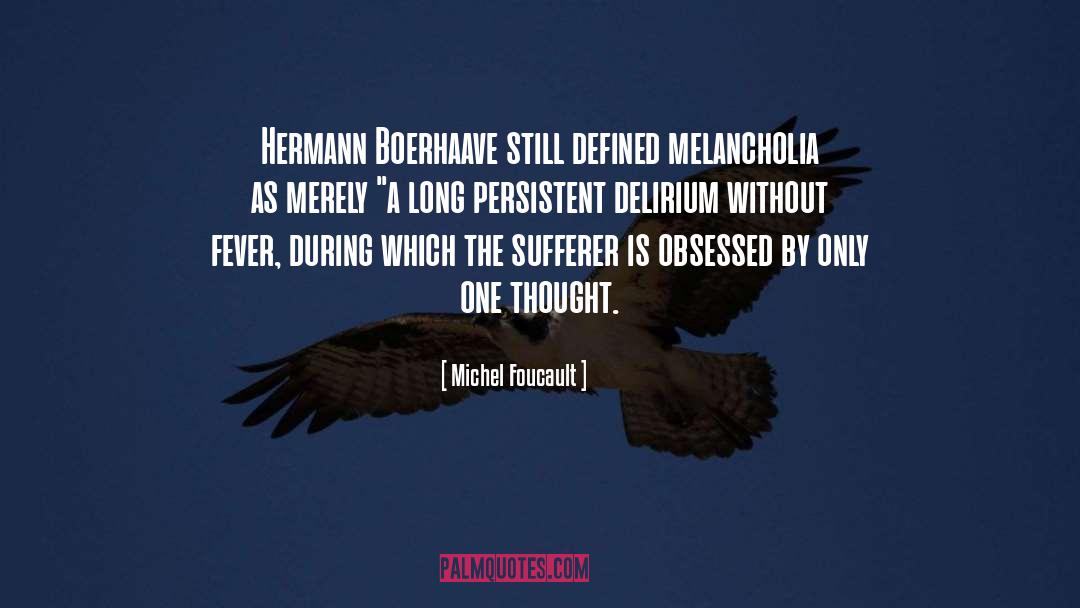
Knowledge is not for knowing: knowledge is for cutting.
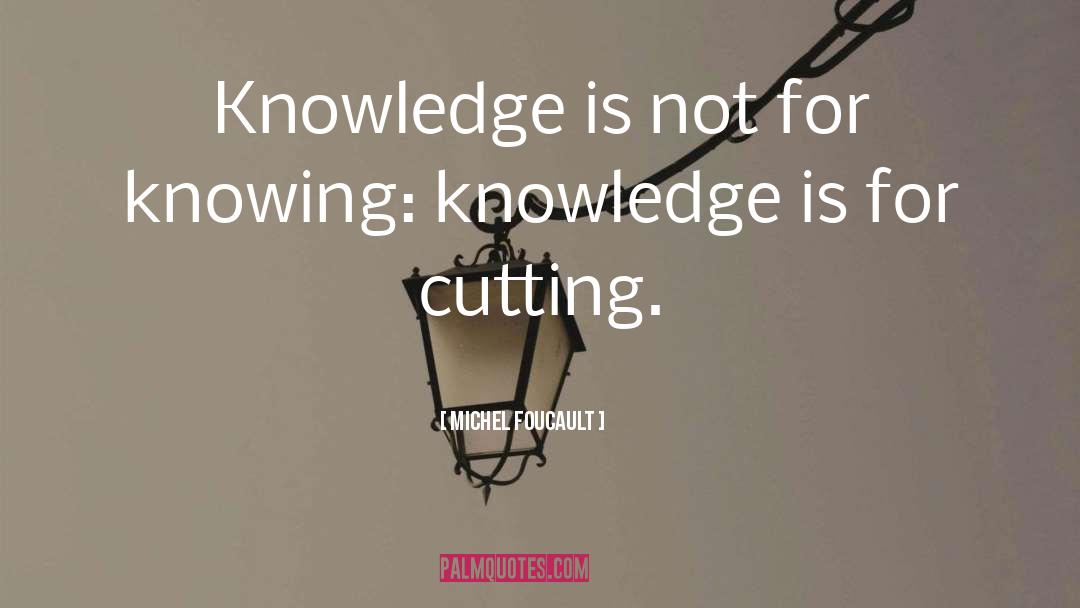
Nietzsche was a revelation to me. I felt that there was someone quite different from what I had been taught. I read him with a great passion and broke with my life, left my job in the asylum, left France: I had the feeling I had been trapped. Through Nietzsche, I had become a stranger to all that.

Hence, too, my main concern will be to locate the forms of power, the channels it takes, and the discourses it permeates in order to reach the most tenuous and individual modes of behavior, the paths that give it access to the rare or scarcely perceivable forms of desire, how it penetrates and controls everyday pleasure - all this entailing effects that may be those of refusal, blockage, and invalidation, but also incitement and intensification: in short, the polymorphous techniques of power.
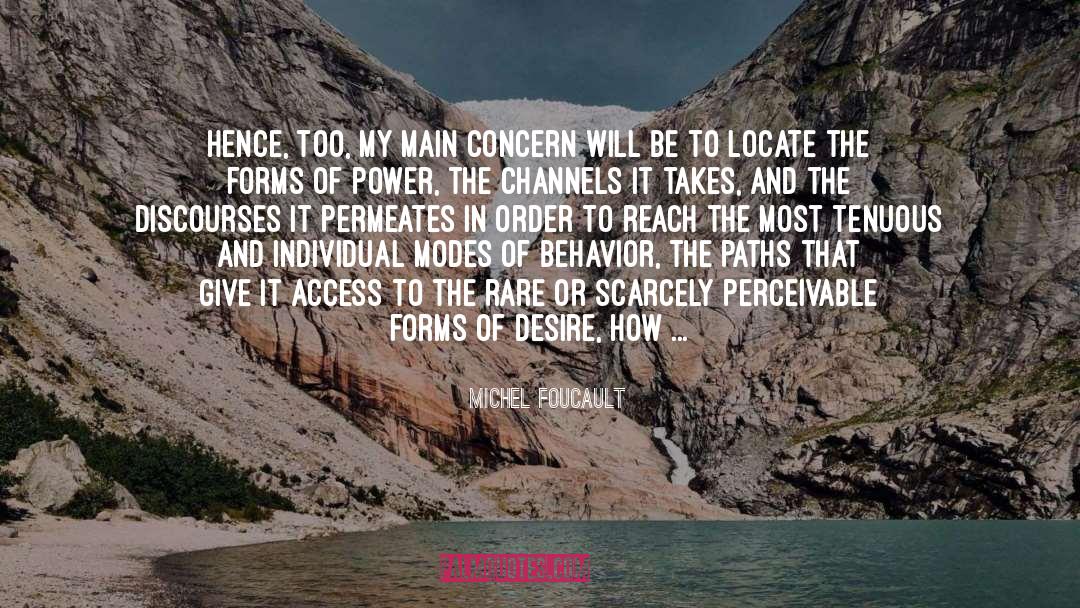
The difference between the Sophist and the ignorant (or stupid) is not the difference between an intentional error (into which one falls in order to trip up one's adversary) and an unintentional error (of which both interlocutors are victims). The Sophist should not be interpreted as someone who uses error as a trap and uses faulty reasoning as a crafty weapon. He occupies a different dimension from that of true or faulty reasoning; he is on the side of the semblance of reasoning. He occupies the dimension of shadow and reflection; he occupies a reasoning mirage, but he does not really reason. And this invalidation, produced not by error but by semblance, affects not only the Sophist's reasoning moreover, it affects all his wisdom, his sophia.
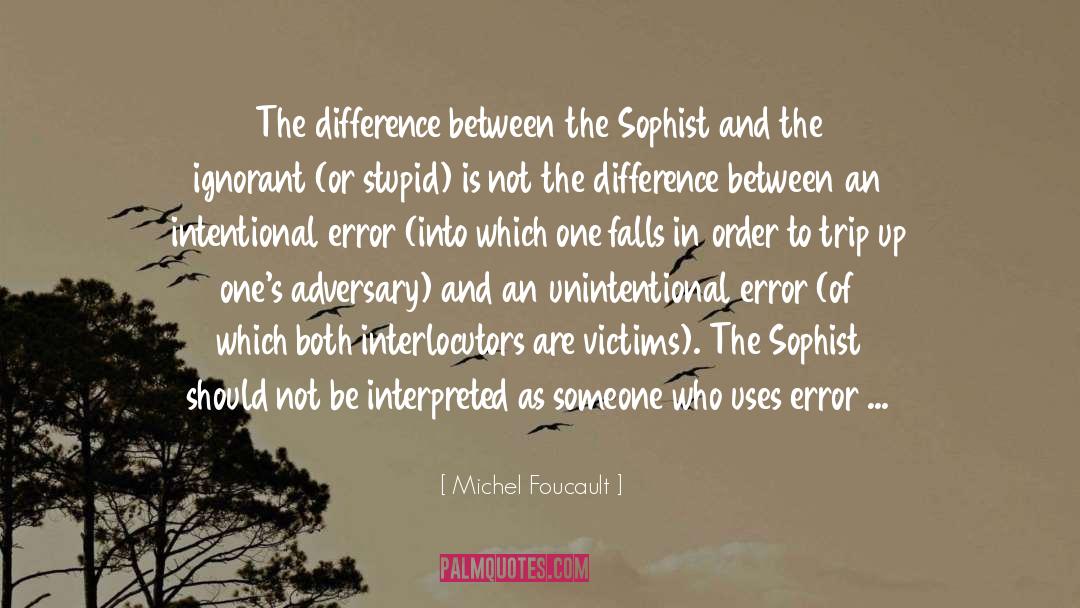
Domination is not that solid and global kind of domination that one person exercises over others, or one group over another, but the manifold forms of domination that can be exercised within society.
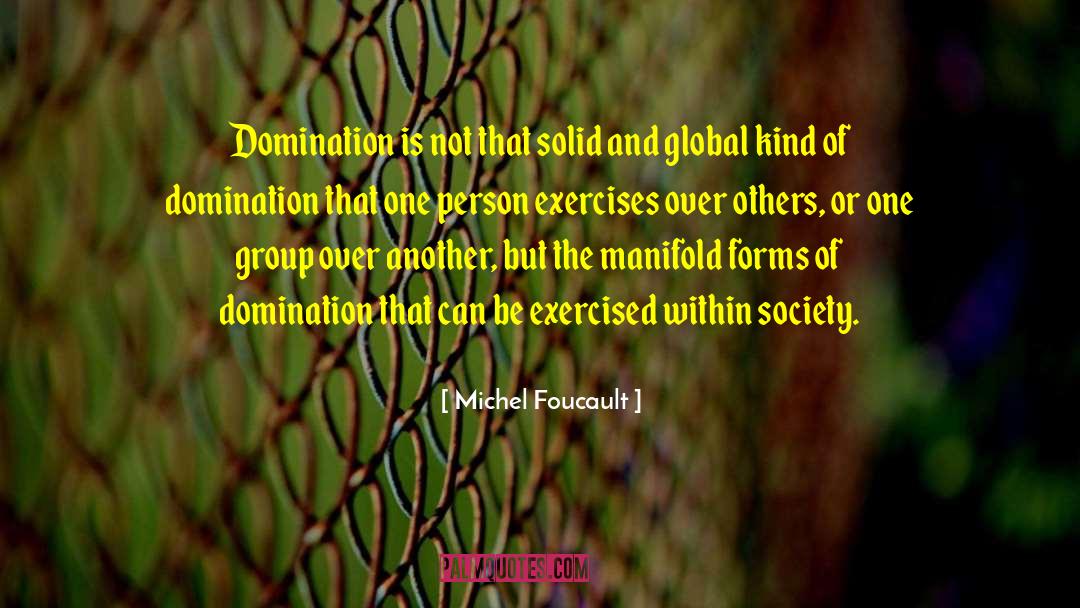
To all those who still wish to talk about man, about his reign or his liberation, to all those who still ask themselves questions about what man is in his essence, to all those who wish to take him as their starting-point in their attempts to reach the truth, to all those who, on the other hand, refer all knowledge back to the truths of man himself, to all those who refuse to formalize without anthropologizing, who refuse to mythologize without demystifying, who refuse to think without immediately thinking that it is man who is thinking, to all these warped and twisted forms of reflection we can answer only with a philosophical laugh – which means, to a certain extent, a silent one.

Where can an interrogation lead us which does not follow reason in its horizontal course, but seeks to retrace in time that constant vertically which confronts European culture with what it is not?

In comparison with the justice exercised with sovereign power by traditional chiefs, the kings of justice, by the powerful of crooked judgments, Hesiodic justice, going from the decree of Zeus to the order of the world, and from this to peasant vigilance and exactness, to the interplay of good understanding and debts repaid, calls for a whole transfer of sovereignty. Calls for it, but does not record it, for at the time of Works and Days justice is institutionalized only in the hands of the kings of justice.
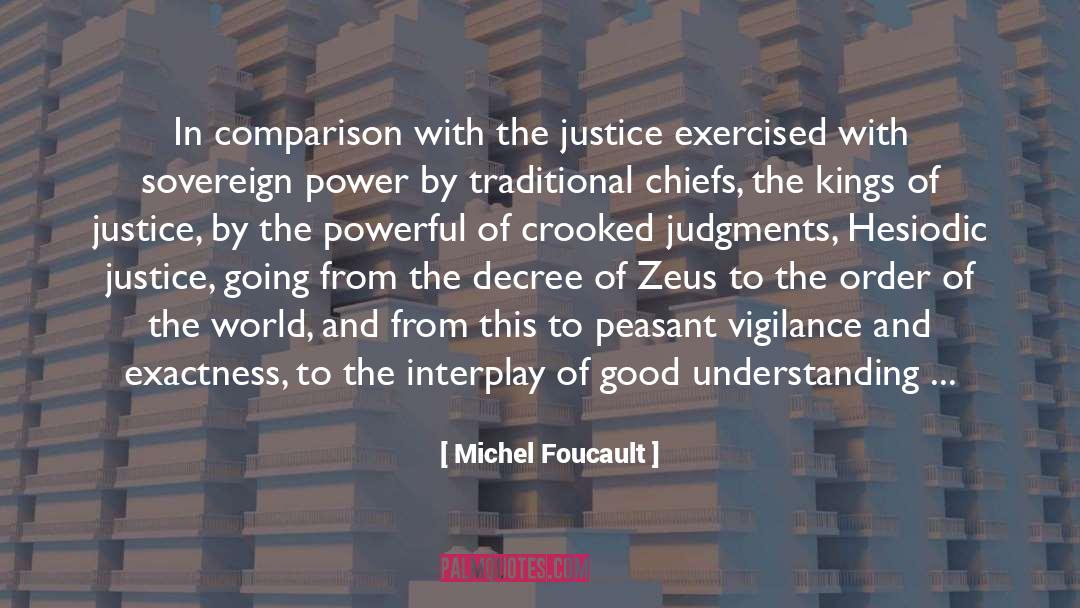
[I]f we desire to learn for bad reasons (so as to get the upper hand over others, or to win unjust cases), then we will have to change in order to learn, or the fact of learning will change the one who learns. In short, the subject of knowledge will not be the same as the subject of desire. Euthydemus: to teach is to kill - and behind all this emerges the big question that philosophy has not ceased to conceal precisely inasmuch as its birth may not be entirely foreign to it: can knowledge be sold? Can it, on the one hand, be closed up on itself like the precious object of greed and possession? And, on the other hand, can it enter into the game and circulation of wealth and goods?
![Michel Foucault Quotes: [I]f we desire to learn Michel Foucault Quotes: [I]f we desire to learn](https://palmquotes.com/author/michel-foucault-quotes-22259.jpg)
'Truth' is to be understood as a system of ordered procedures for the production, regulation, distribution, circulation and operation of statements. 'Truth' is linked in a circular relation with systems of power which produce and sustain it, and to effects of power which it induces and which extend it. A 'regime' of truth.
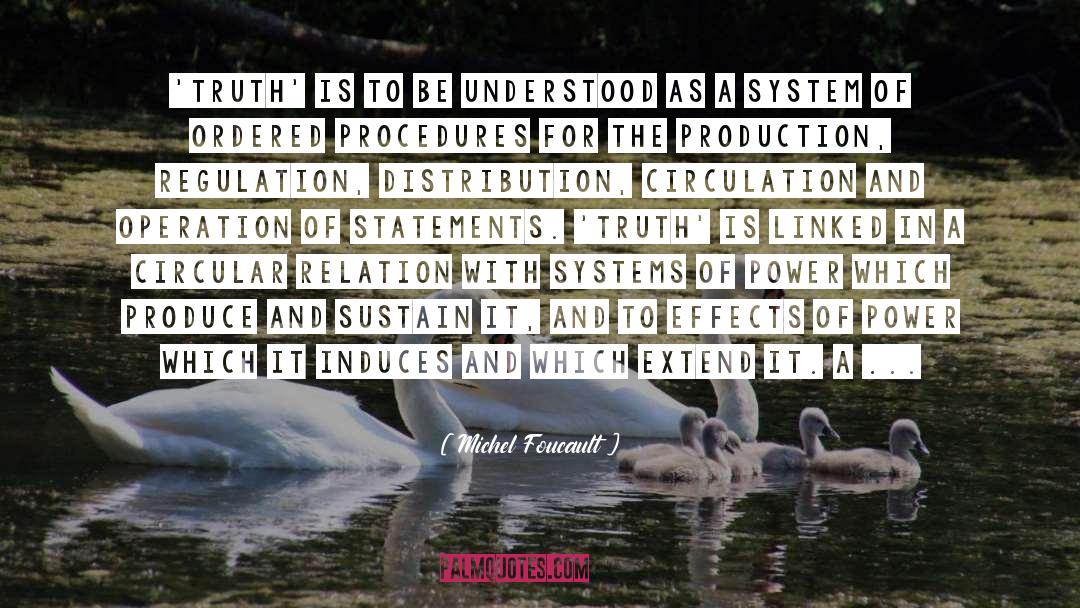
There is no binary division to be made between what one says and what one does not say; we must try to determine the different ways of not saying things.
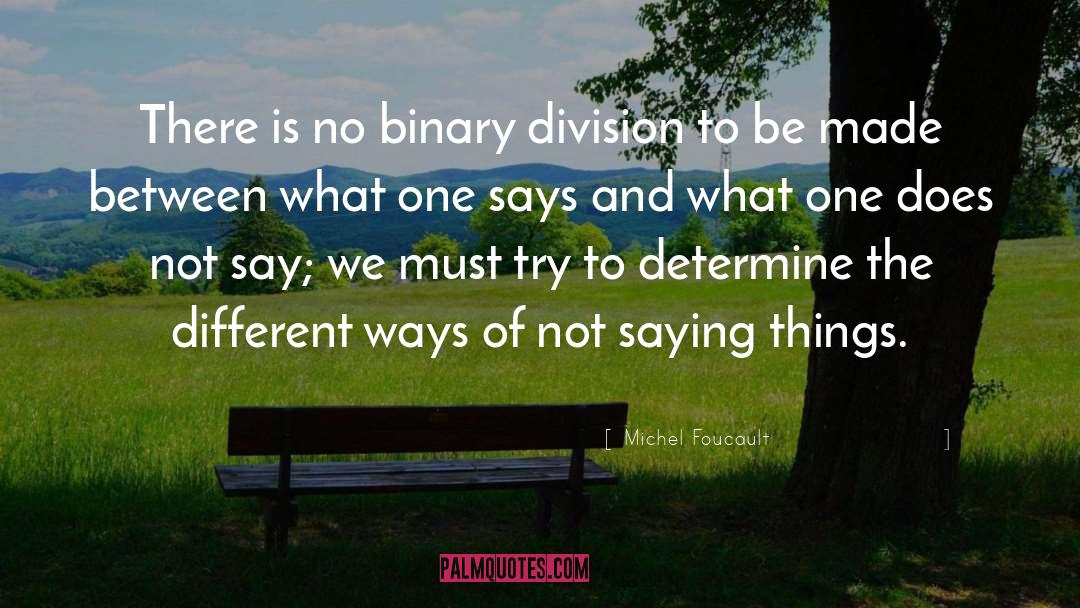
That is not all, however: this relationship between writing and death is also manifested in the effacement of the writing subject's individual characteristics. Using all the contrivances that he steps up between himself and what he writes, the writing subject cancels out the signs of his particular individuality. As a result, the mark of the writer is reduced to nothing more that the singularity of his absence; he must assume the role of the dead man in the game of writing.
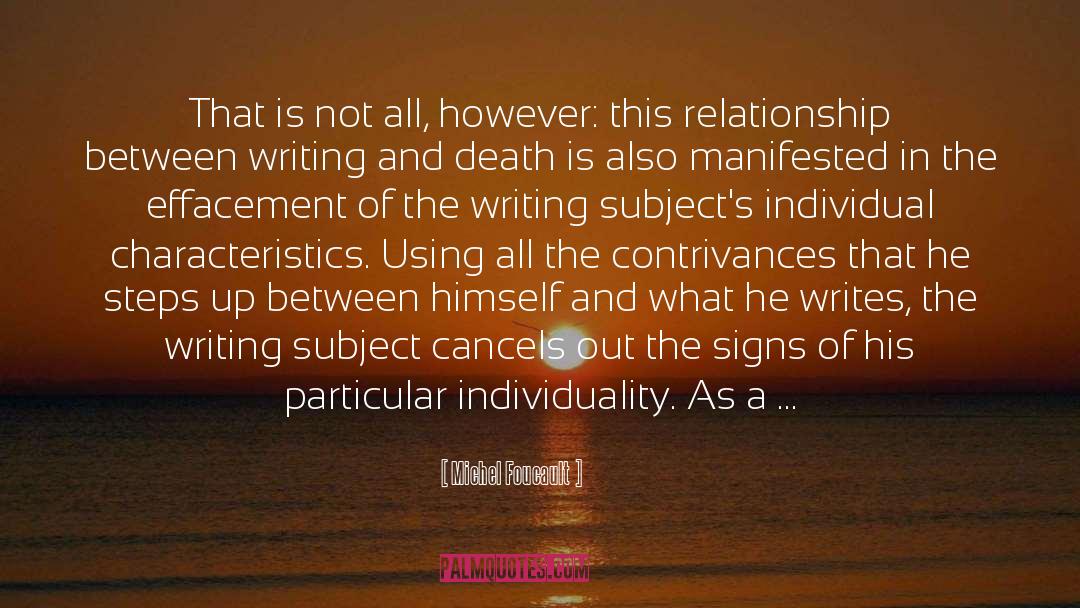
When language arrives at its own edge, what it finds is not a positivity that contradicts it, but the void that will efface it. Into that void it must go, consenting to come undone in the rumbling, in the immediate negation of what it says, in a silence that is not the intimacy of a secret but a pure outside where words endlessly unravel.
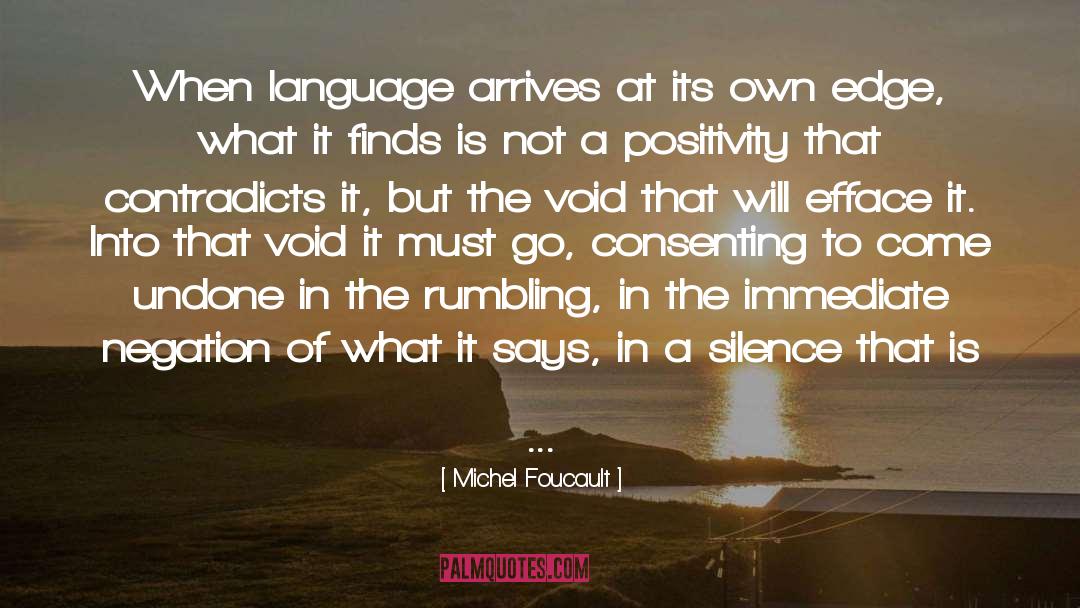
Why am I so interested in politics? But if I were to answer you very simply, I would say this: why shouldn't I be interested? That is to say, what blindness, what deafness, what density of ideology would have to weigh me down to prevent me from being interested in what is probably the most crucial subject to our existence, that is to say the society in which we live, the economic relations within which it functions, and the system of power which defines the regular forms and the regular permissions and prohibitions of our conduct. The essence of our life consists, after all, of the political functioning of the society in which we find ourselves.
So I can't answer the question of why I should be interested; I could only answer it by asking why shouldn't I be interested?
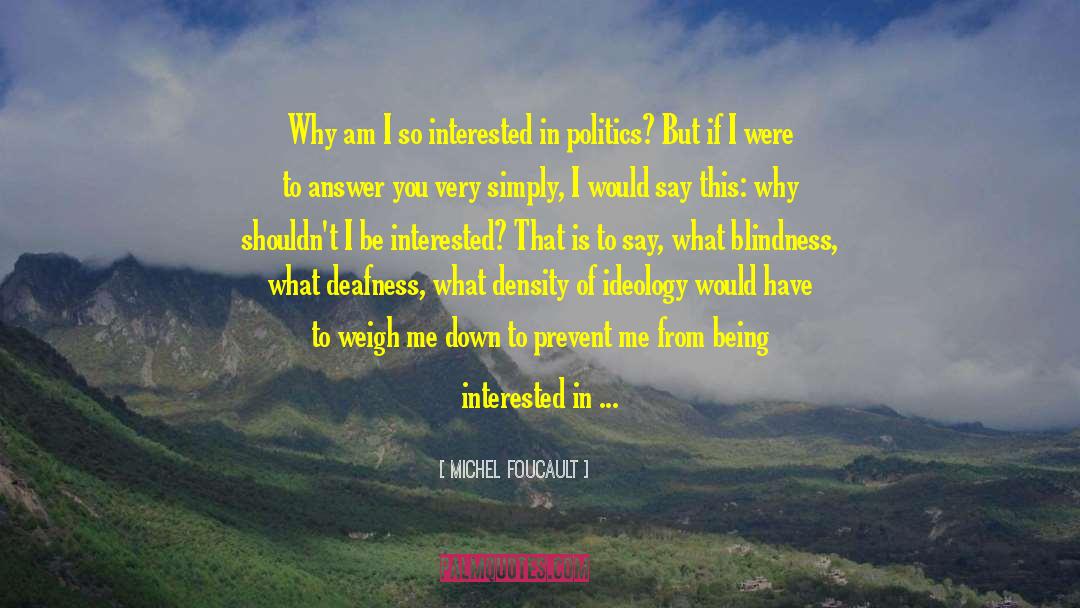
And the good ruler is precisely the one who exercises his power as it ought to be exercised, that is, simultaneously exercising his power over himself. And it is the power over oneself that thus regulates one's power over others.
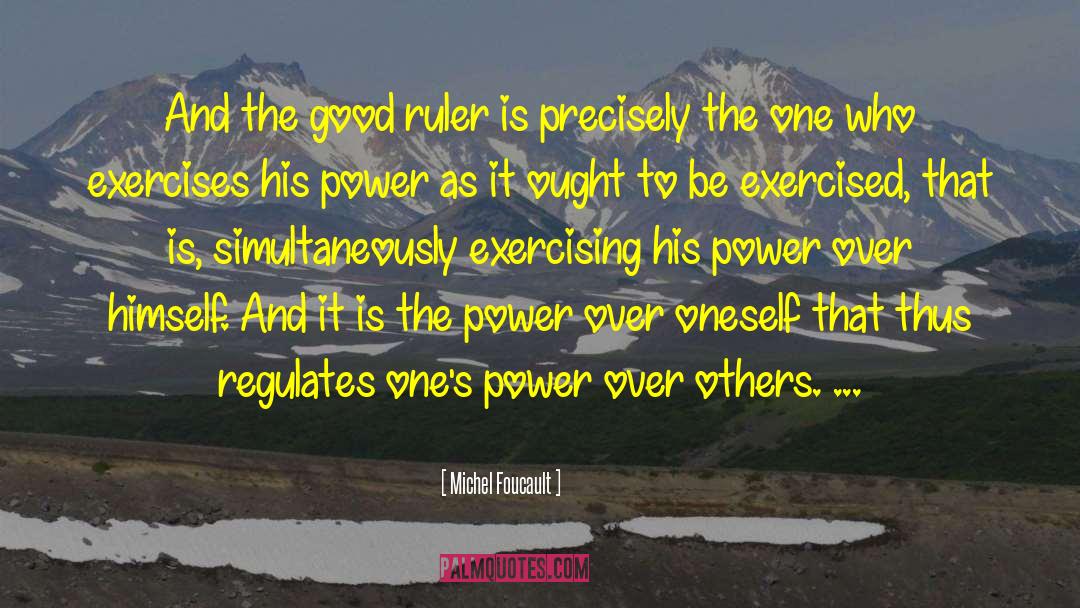
A symbolic unity formed by the languor of the fluids, by the darkening of the animal spirits and the shadowy twilight they spread over the images of things, by the viscosity of the blood that laboriously trickles through the vessels, by the thickening of vapors that have become blackish, deleterious, and acrid, by visceral functions that have become slow and somehow slimy-this unity, more a product of sensibility than of thought or theory, gives melancholia its characteristic stamp.
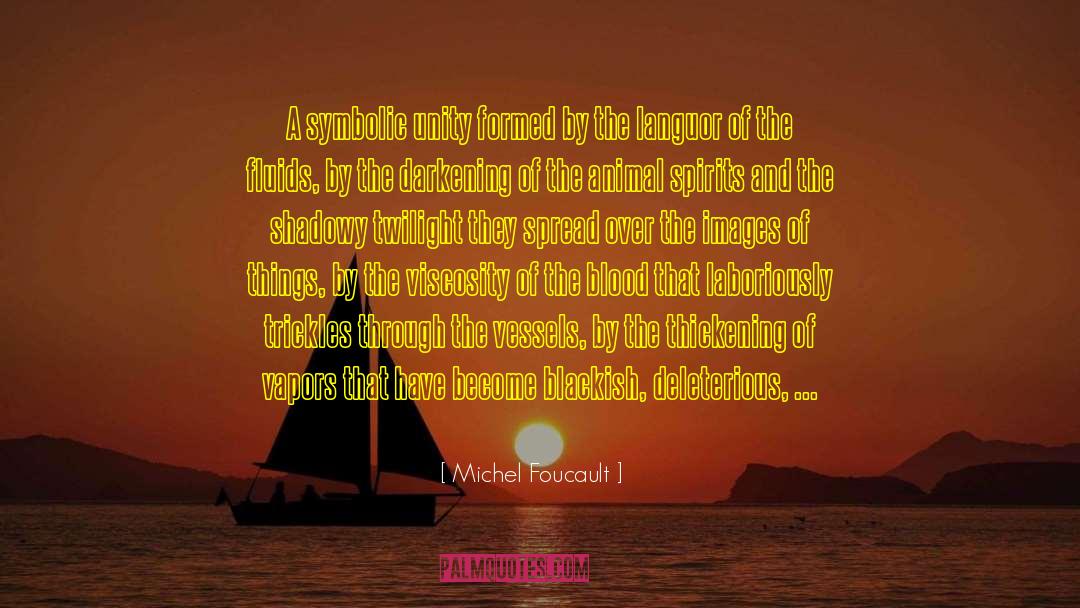
The institution of monarchy developed during the Middle Ages against the backdrop of the previously endemic struggles between feudal power agencies. The monarchy presented itself as a referee, aa power capable of putting an end to war, violence, and pillage and saying no to these struggles and private feuds. It made itself acceptable by allocating itself a juridical and negative function, albeit one whose limits it naturally began at once to overstep.
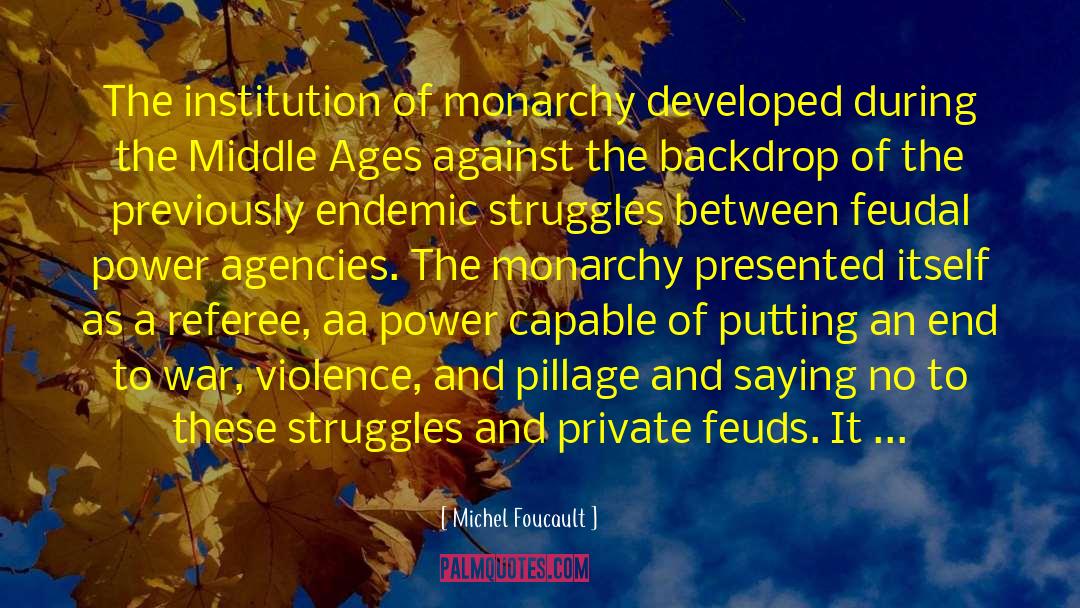
Knowledge is not made for understanding; it is made for cutting.
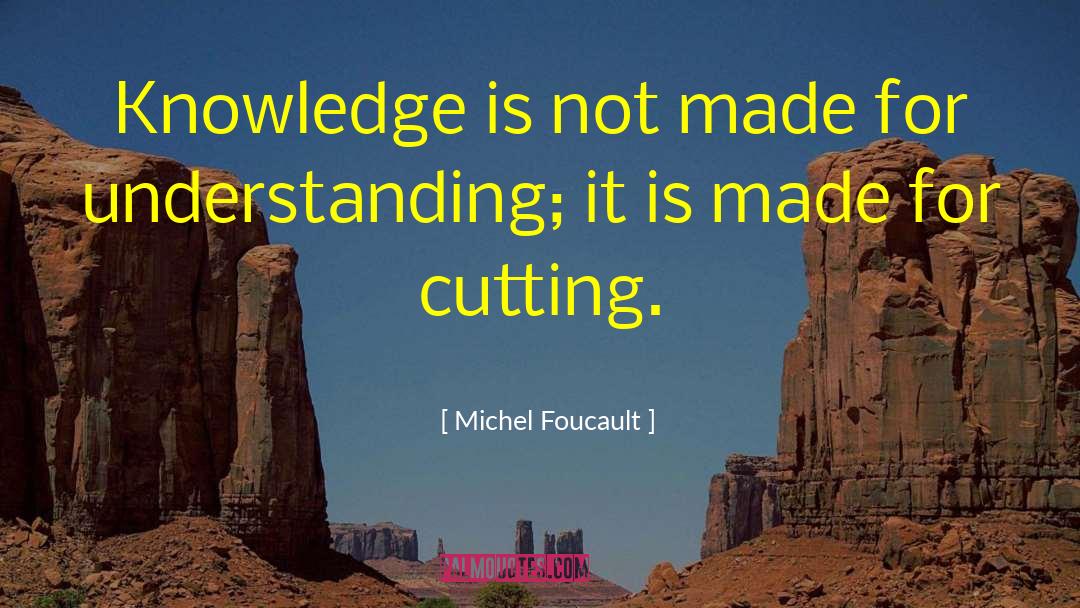
As soon as you start writing, even if it is under your real name, you start to function as somebody slightly different, as a "writer". You establish from yourself to yourself continuities and a level of coherence which is not quite the same as your real life ... All this ends up constituting a kind of neo-identity which is not identical to your identity as a citizen or your social identity, Besides you know this very well, since you want to protect your private life.
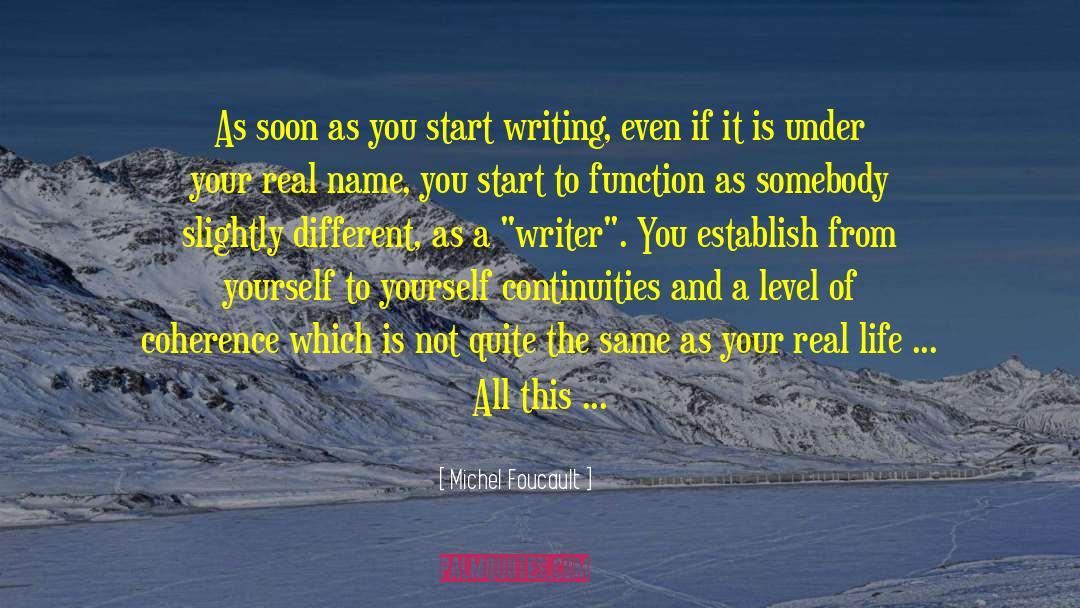
In the Middle Ages and the Renaissance, man's dispute with madness was dramatic debate in which he confronted the secret powers of the world; the experience of madness was clouded by images of the Fall and the Will of God, of the Beast and the Metamorphosis, and of all the marvelous secrets of Knowledge
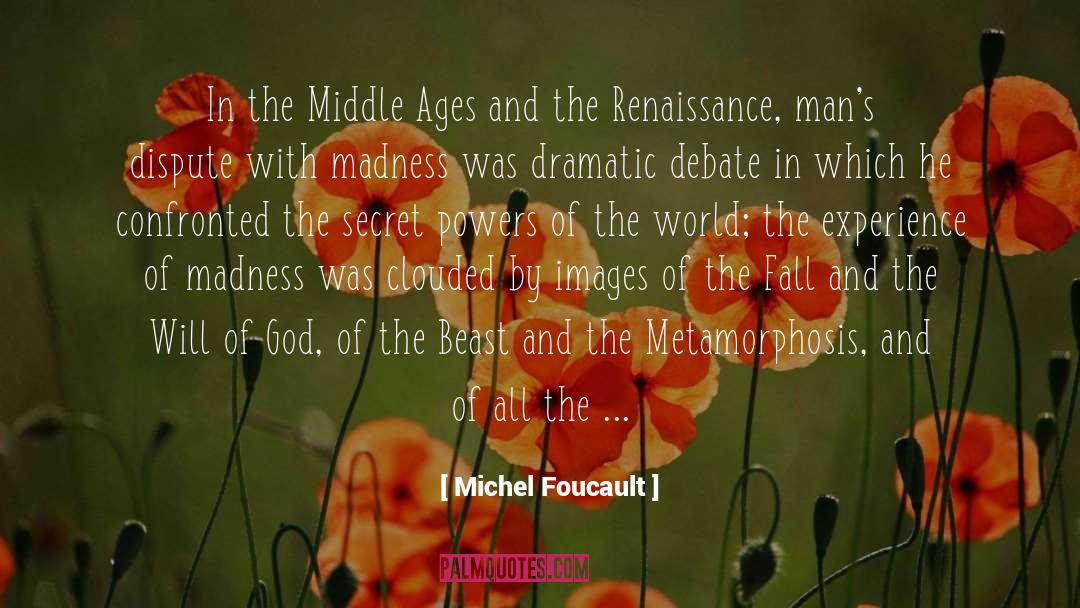
I belong to that generation who, as students, had before their eyes, and were limited by, a horizon consisting of Marxism, phenomenology and existentialism. For me the break was first Beckett's Waiting for Godot, a breathtaking performance.
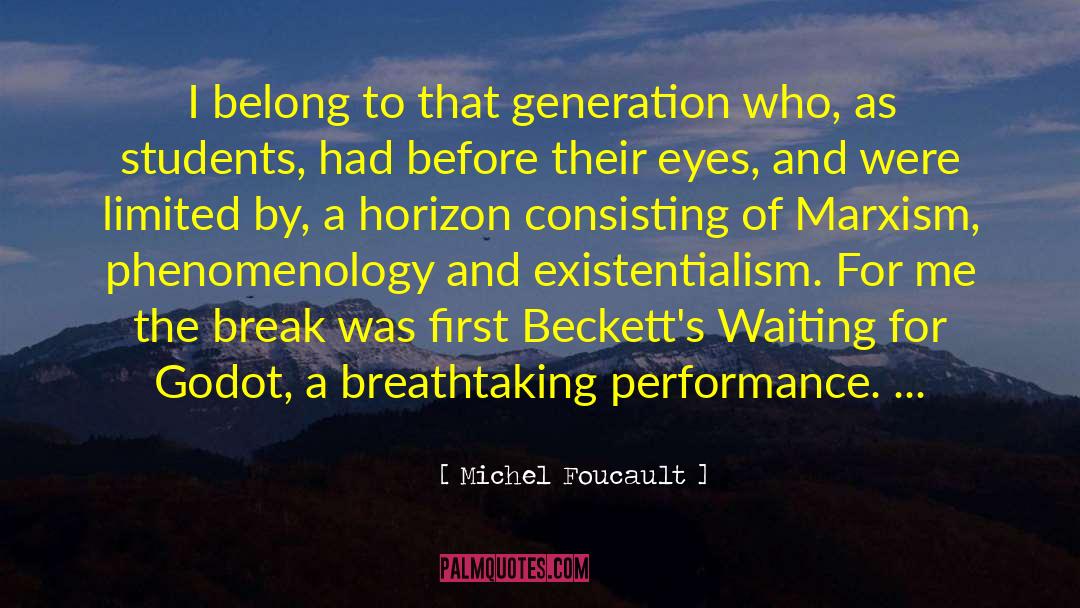
Modern society is perverse, not in spite of its puritanism or as if from a backlash provoked by its hypocrisy; it is in actual fact, and directly, perverse.
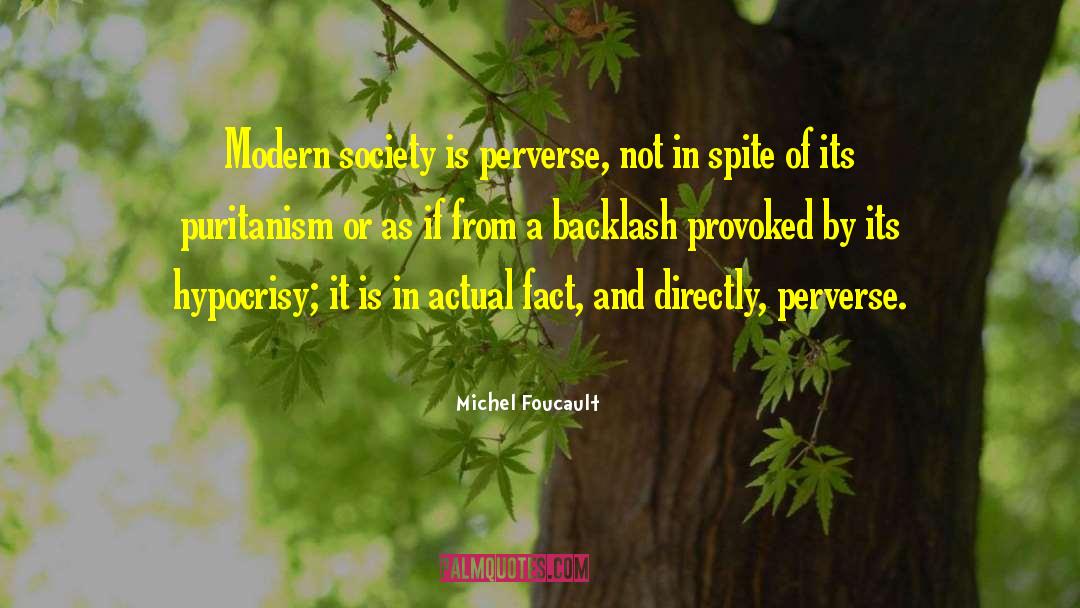
One makes war to win, not because it's just.
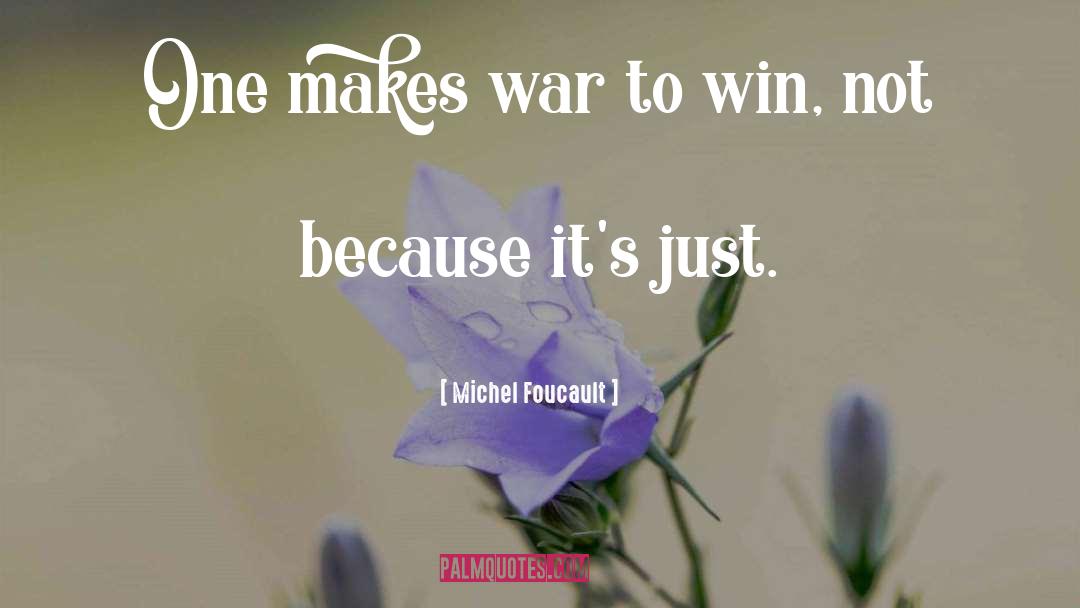
I'm struck by the difficulty I had in formulating it. When I think back now, I ask myself what else it was that I was talking about in Madness and Civilization or The Birth of the Clinic, but power? Yet I'm perfectly aware that I scarcely ever used the word and never had such a field of analyses at my disposal. I can say that this was an incapacity linked undoubtedly with the political situation in which we found ourselves. It is hard to see where, either on the Right or the Left, this problem of power could then have been posed. On the Right, it was posed only in terms of constitution, sovereignty, and so on, that is, in juridical terms; on the Marxist side, it was posed only in terms of the state apparatus. The way power was exercised - concretely, and in detail - with its specificity, its techniques and tactics, was something no one attempted to ascertain; they contented themselves with denouncing it in a polemical and global fashion as it existed among the "other," in the adversary camp. Where Soviet socialist power was in question, its opponents called it totalitarianism; power in Western capitalism was denounced by the Marxists as class domination; but the mechanics of power in themselves were never analyzed.
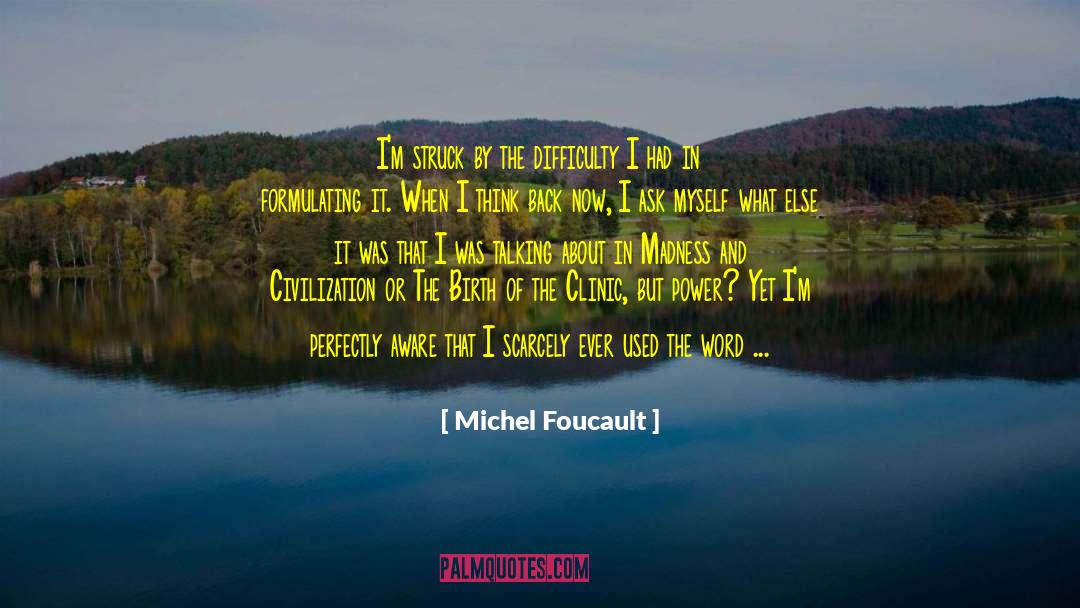
For millennia, man remained what he was for Aristotle: a living animal with the additional capacity for a political existence; modern man is an animal whose politics places his existence as a living being in question
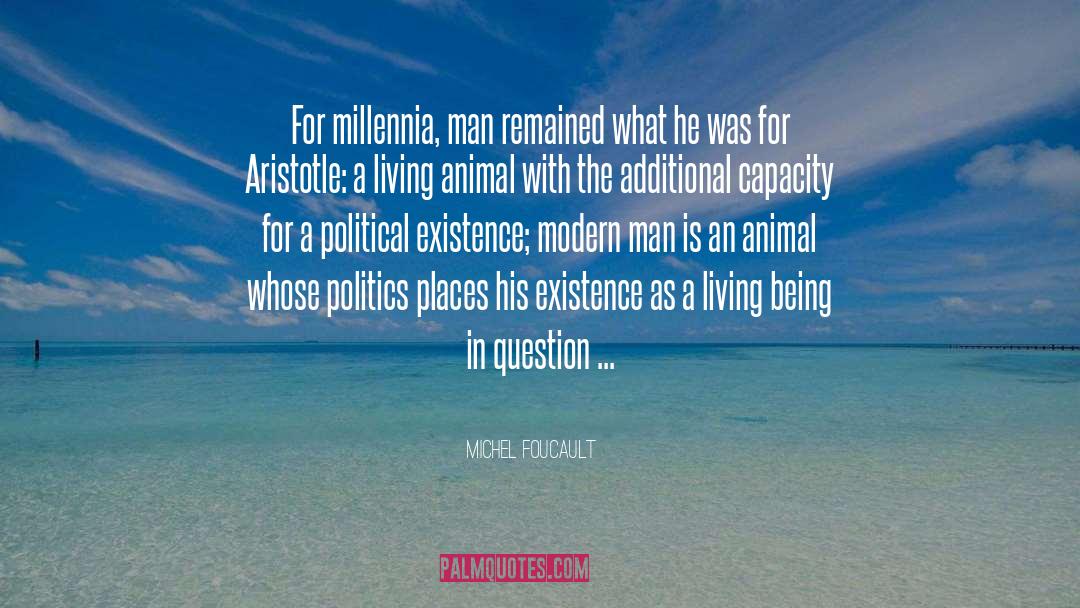
The strategic adversary is fascism ... the fascism in us all, in our heads and in our everyday behavior, the fascism that causes us to love power, to desire the very thing that dominates and exploits us.
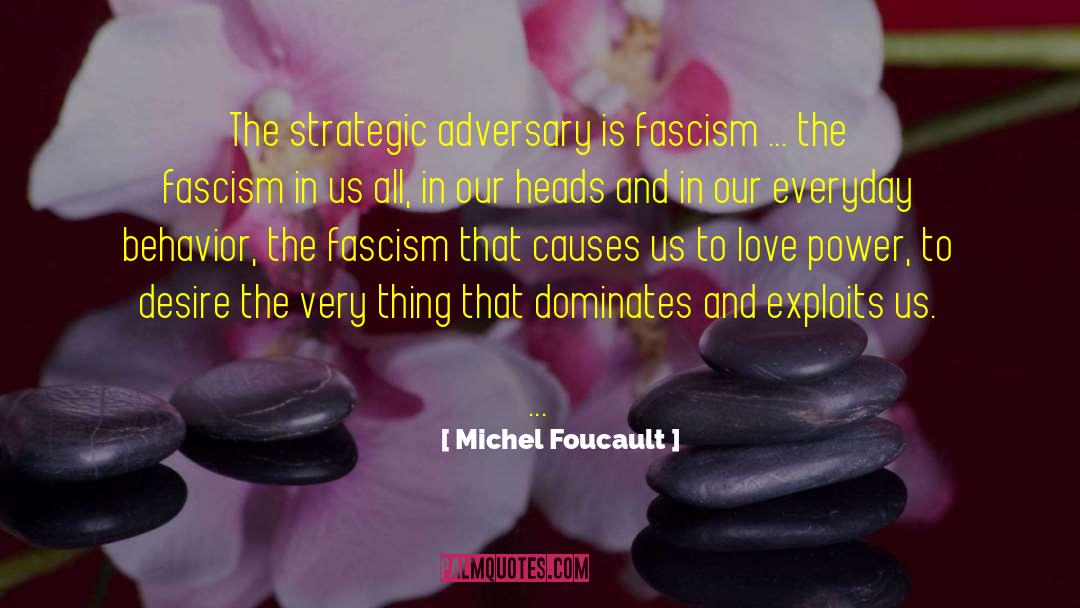
Thus, seeking to produce a typology of forms of the art of government, La Mothe Le Vayer, in a text from the following century (consisting of educational writings intended for the French Dauphin), says that there are three fundamental types of government, each of which relates to a particular science or discipline: the art of self-government, connected with morality; the art of properly governing a family, which belongs to economy; and finally the science of ruling the state, which concerns politics. What matters, notwithstanding this typology, is that the art of government is always characterized by the essential continuity of one type with the other, and of second type with the third.
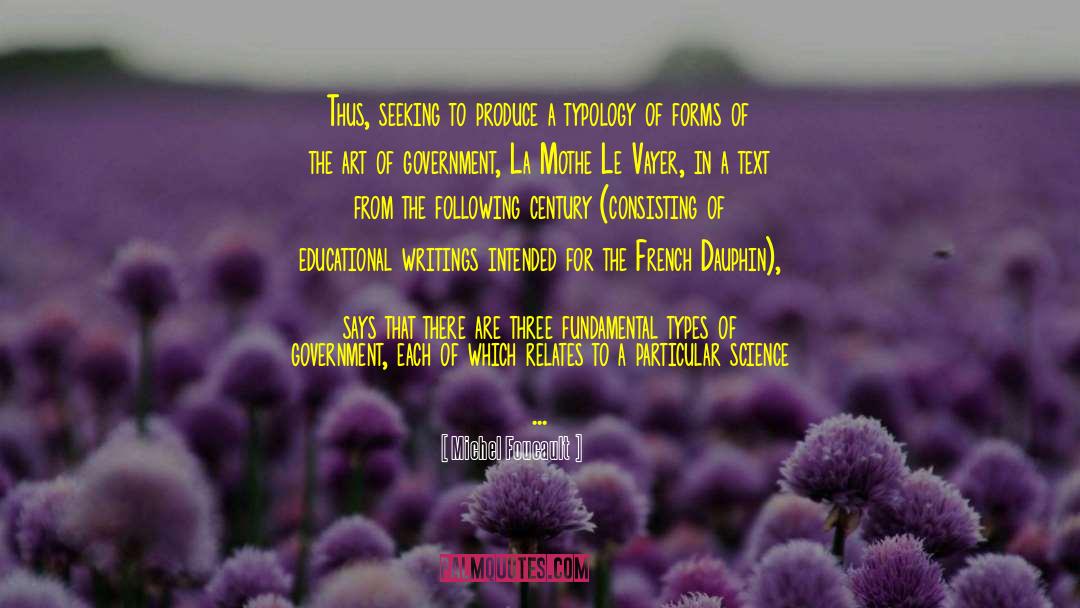
Confined on the ship, from which there is no escape, the madman is delivered to the river with its thousand arms, the sea with its thousand roads, to that great uncertainty external to everything. He is a prisoner in the midst of what is the freest, the openest of routes: bound fast at the infinite crossroads. He is the Passenger par excellence: that is, the prisoner of the passage. And the land he will come to is unknown - as is, once he disembarks, the land from which he comes. He has his truth and his homeland only in that fruitless expanse between two countries that cannot belong to him.

The language of psychiatry is a monologue of reason about madness
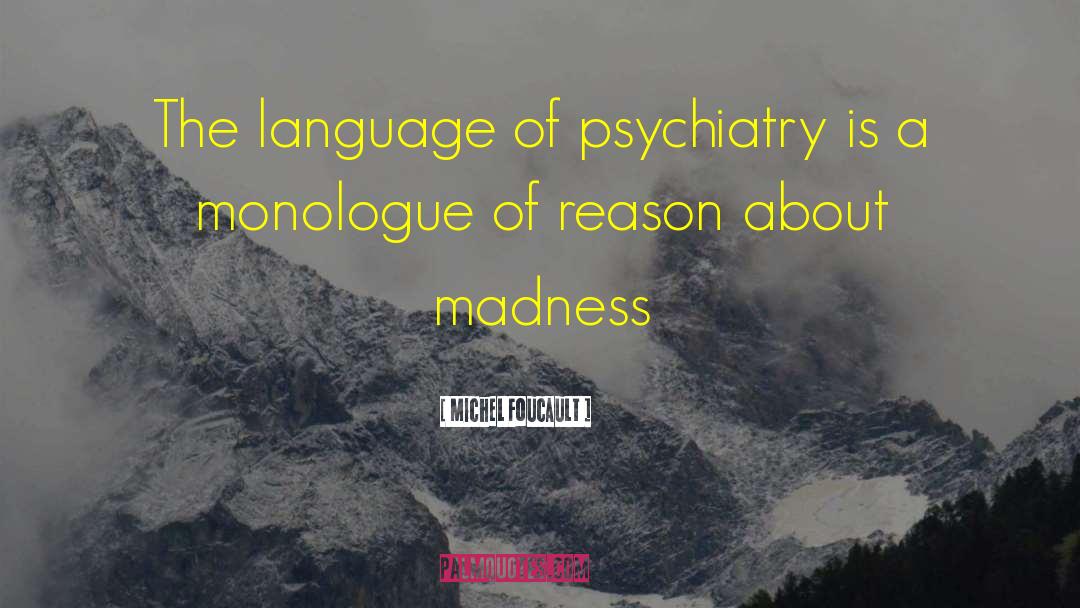
At every moment, step by step, one must confront what one is thinking and saying with what one is doing, what one is.
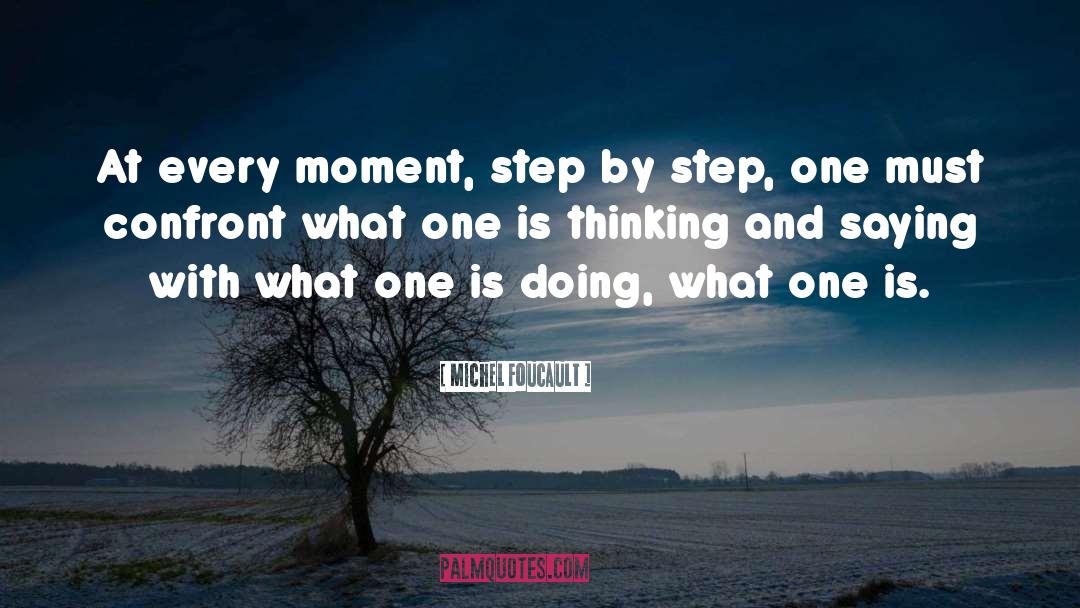
It was a matter of showing by what conjunctions a whole set of practices-- from the moment they became coordinated with a regime of truth––was able to make what does not exist (madness, disease, delinquency, sexuality), nonetheless become something, something however that continues not to exist. That is to say, what I would like to show is not how an error––when I say that which does not exist becomes something, this does not mean showing how it is possible for an error to be constructed––or how an illusion could be born, but how a regime of truth and therefore not an error, makes something that does not exist able to become something. It is not an illusion because it is a set of practices, real practices, which establish it and thus imperiously marks it out in reality... The point of all these investigations concerning madness, disease, delinquency, sexuality, and what i am talking about now, is to show how the coupling of a set of practices and a regime of truth from an apparatus (dispotif) of knowledge-power that effectively marks out in reality that which does not exist and legitimately submits it to the division between true and false. In the things I am presently concerned with, the moment when that which does not exist is inscribed in reality, and when that which does not exist comes under a legitimate regime of the true and false, marks the birth of this dissymmetrical bipolarity of politics and the economy. Politics and the economy are not things that exist, or error
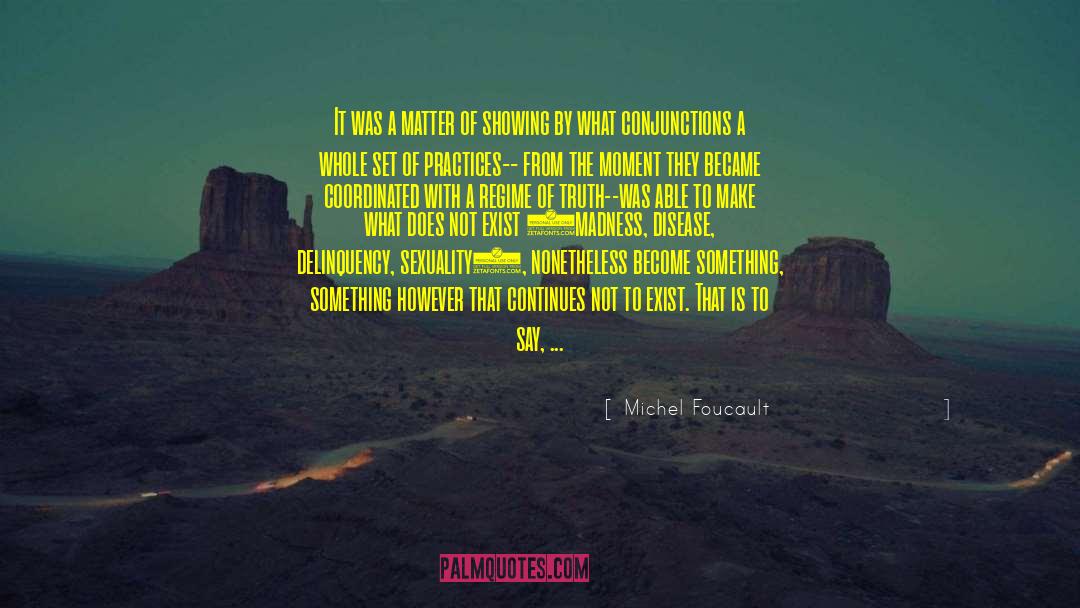
[L]et us say that we are obliged to produce the truth by the power that demands truth and needs it in order to function: we are forced to tell the truth, we are constrained, we are condemned to admit the truth or to discover it.
![Michel Foucault Quotes: [L]et us say that we Michel Foucault Quotes: [L]et us say that we](https://palmquotes.com/author/michel-foucault-quotes-252691.jpg)
Thought is no longer theoretical. As soon as it functions it offends or reconciles, attracts or repels, breaks, dissociates, unites or reunites; it cannot help but liberate or enslave. Even before prescribing, suggesting a future, saying what must be done, even before exhorting or merely sounding an alarm, thought, at the level of its existence, in its very dawning, is in itself an action-a perilous act.
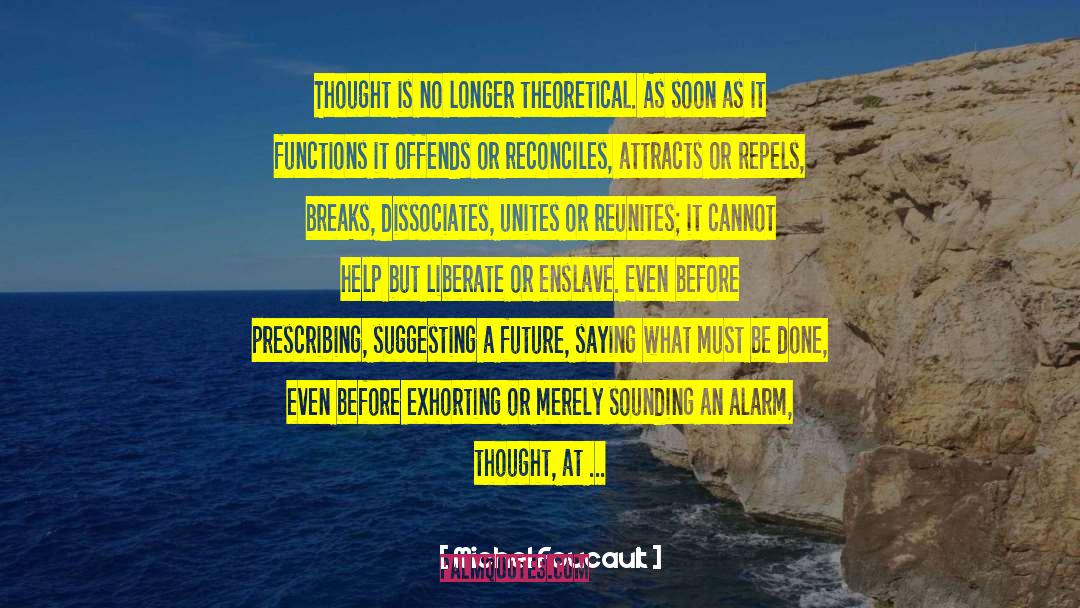
What makes power hold good, what makes it accepted, is simply the fact that it doesn't only weigh on us as a force that says no, but that it traverses and produces things, it induces pleasure, forms knowledge, produces discourse. It needs to be considered as a productive network which runs through the whole social body, much more than as a negative instance whose function is repression
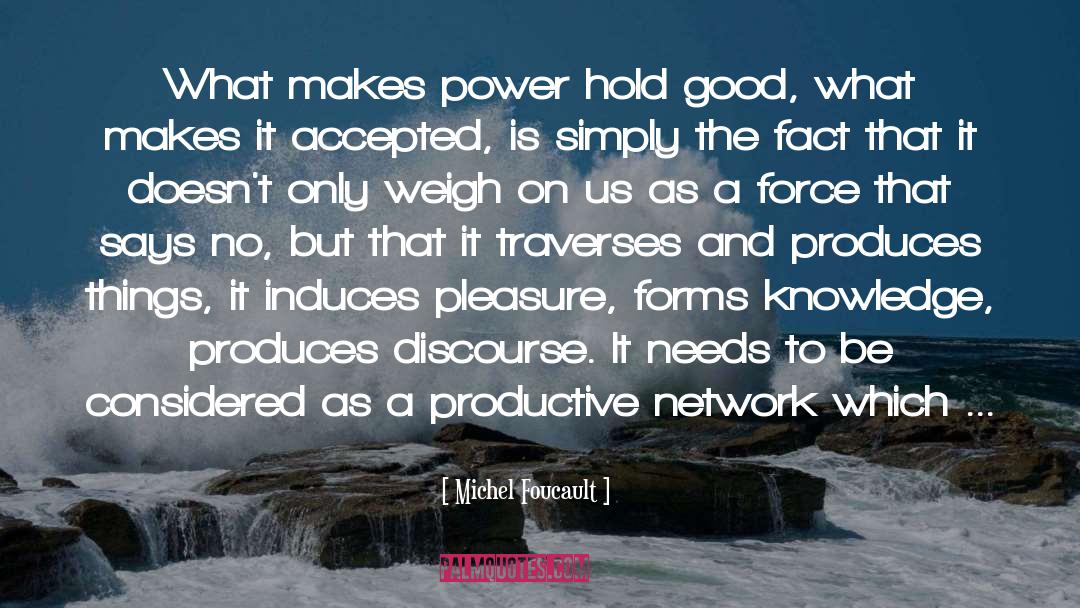
Relations of power "are indissociable from a discourse of truth, and they can neither be established nor function unless a true discourse is produced, accumulated, put into circulation, and set to work. Power cannot be exercised unless a certain economy of discourses of truth functions in, on the basis of, and thanks to, that power."
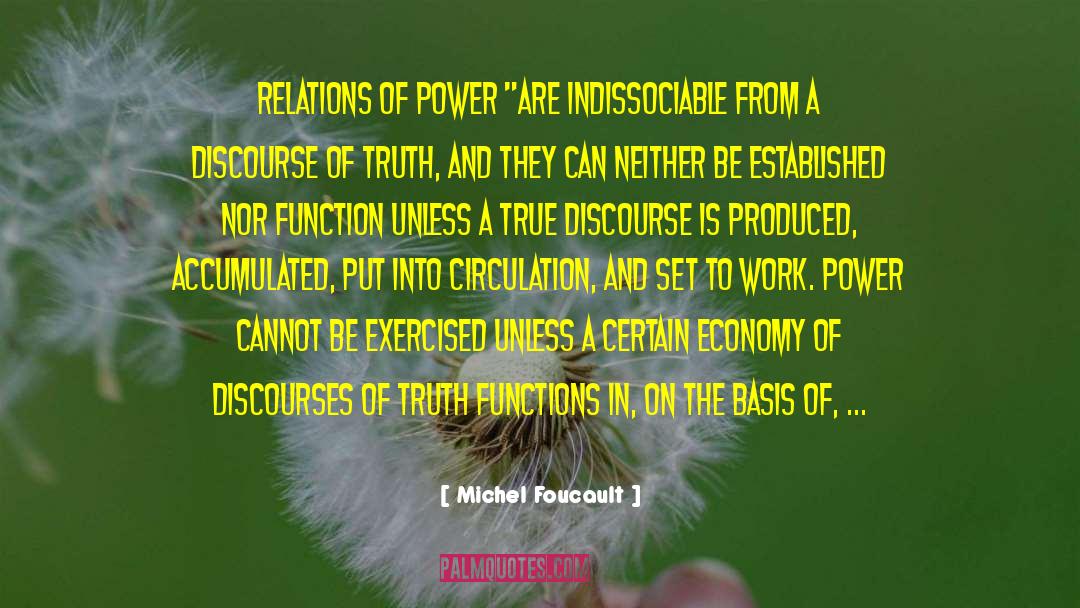
there is no glory in punishing
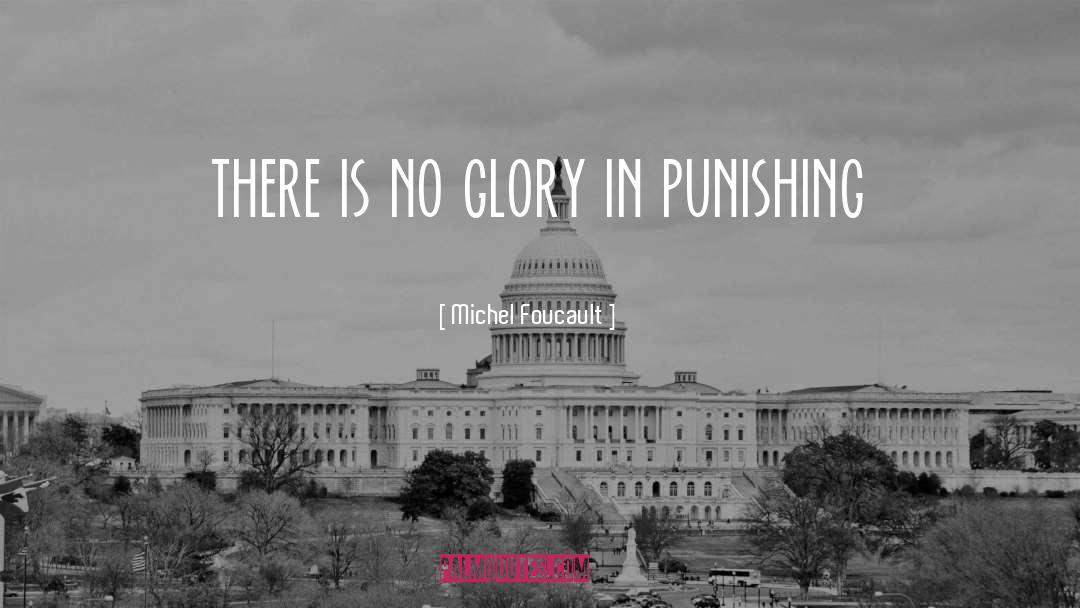
We are obliged to produce the truth by the power that demands truth and needs it in order to function: we are constrained, we are condemned to admit the truth or to discover it. Power constantly asks questions and questions us; it constantly investigates and records; it institutionalizes the search for the truth, professionalizes it, and rewards it ... In a different sense, we are also subject to the truth in the sense that truth lays down the law: it is the discourse of truth that decides, at least in part; it conveys and propels effects of power.
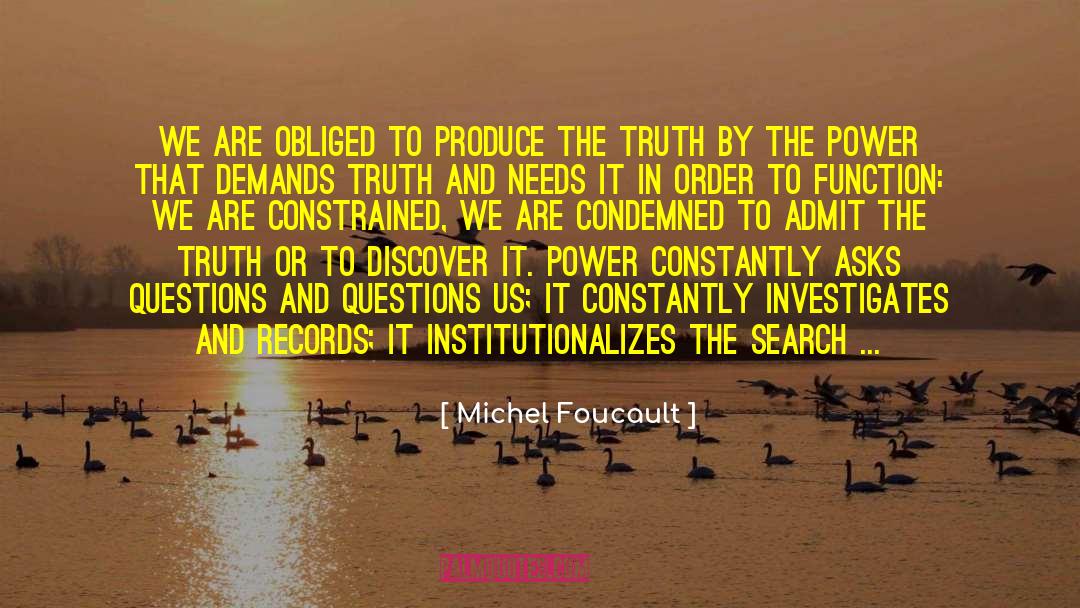
Punishment of a less immediately physical kind, a certain discretion in the art of inflicting pain, a combination of more subtle, more subdued sufferings, deprived of their visible display, should not all this be treated as a special case, an incidental effect of deeper changes? And yet the fact remains that a few decades saw the disappearance of the tortured, dismembered, amputated body, symbolically branded on face or shoulder, exposed alive or dead to public view. The body as the major target of penal repression disappeared. By
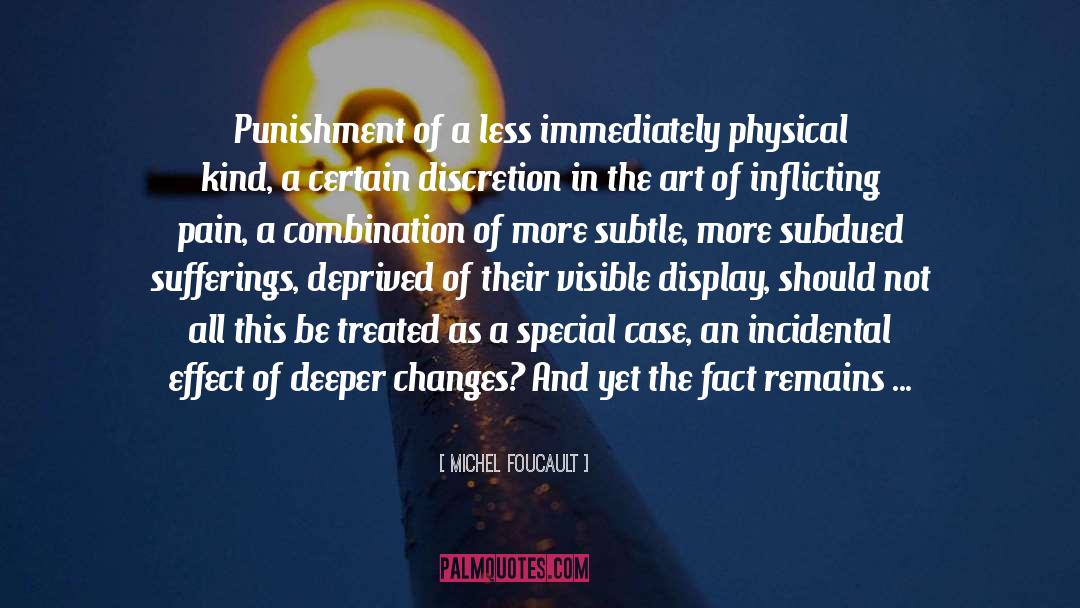
People can tolerate two homosexuals they see leaving together, but the next day they're smiling, holding hands, tenderly embracing one another, then they cannot be forgiven. It is not the departure for pleasure that is unacceptable, it is waking up happy.
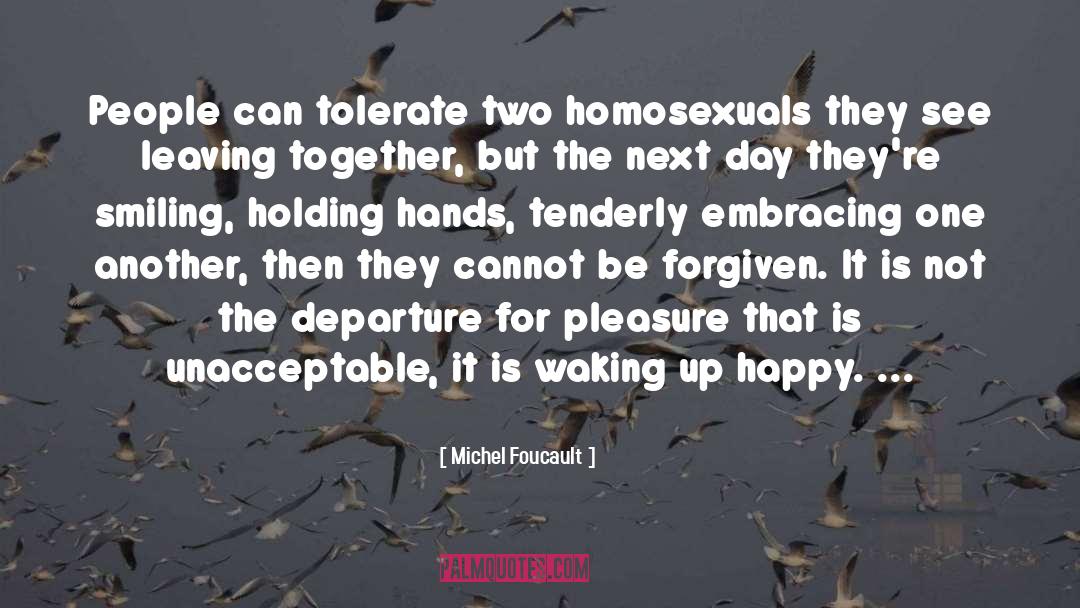
We are freer than we think.

This last point is a request to the English-speaking reader. In France, certain half-witted 'commentators' persist in labelling me a 'structuralist'. I have been unable to get it into their tiny minds that I have used none of the methods, concepts, or key terms that characterize structural analysis. I should be grateful if a more serious public would free me from a connection that certainly does me honour, but that I have not deserved.
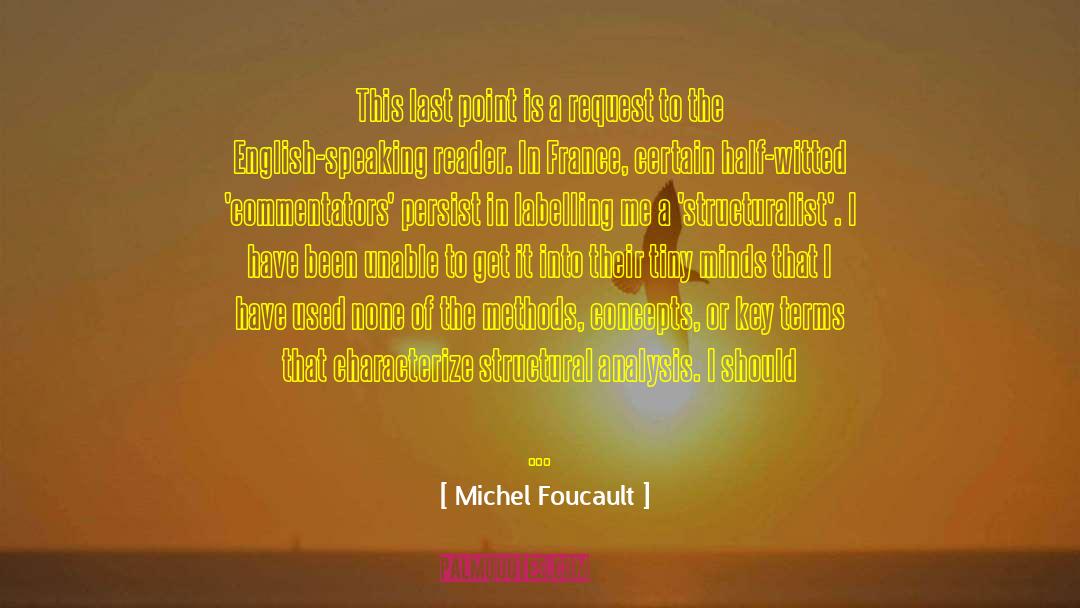
In saying that the truth is both said and not said by the philosopher (said and not said in the form of stammering), Aristotle was still close to the methods of interpretation used by grammarians in their commentaries on the poets. Symbolic or allegorical methods pointing out what was deliberately hidden by Homer behind the figure of Nestor or Ulysses.
But there is a difference however - and a crucial one - which is that for Aristotle the equivocation of the said and the not-said, this distance without gap which means that the truth is both hidden and present in the philosopher's words, this light that is shadow, is not the effect of an oracular kind of intentional secret or prudent reserve. If philosophers do not speak the truth, this is not because their indulgence wishes to protect men from its terrible face; it is because they lack a certain knowledge (savoir).

Resistances do not derive from a few heterogeneous principles; but neither are they a lure or a promise that is of necessity betrayed. They are the odd term in relations of power; they are inscribed in the latter as an irreducible opposite.
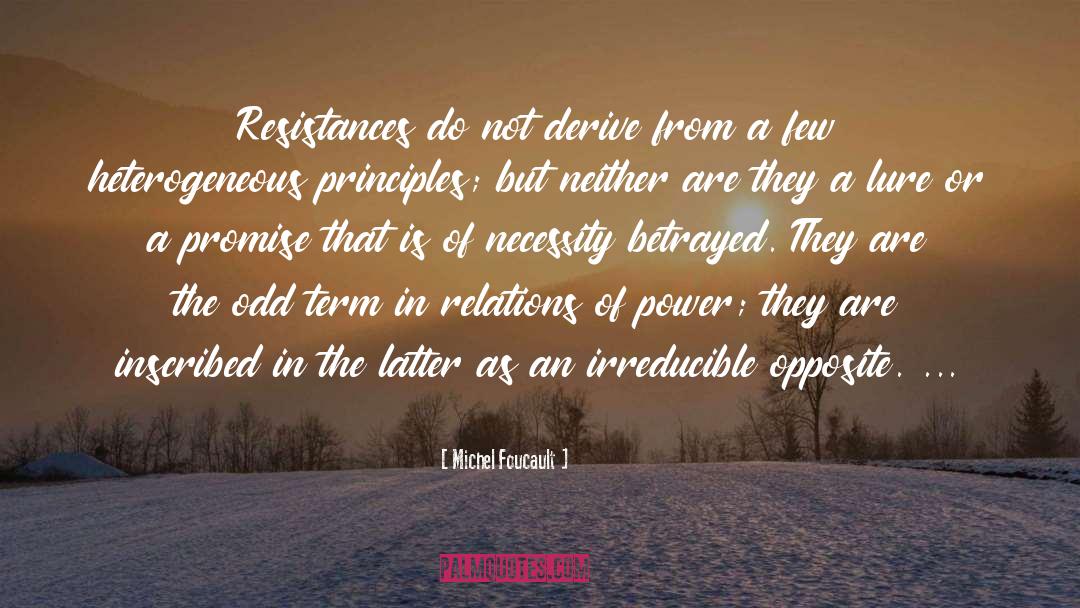
The head that will become a skull is already empty. Madness is the déjà-là of death.
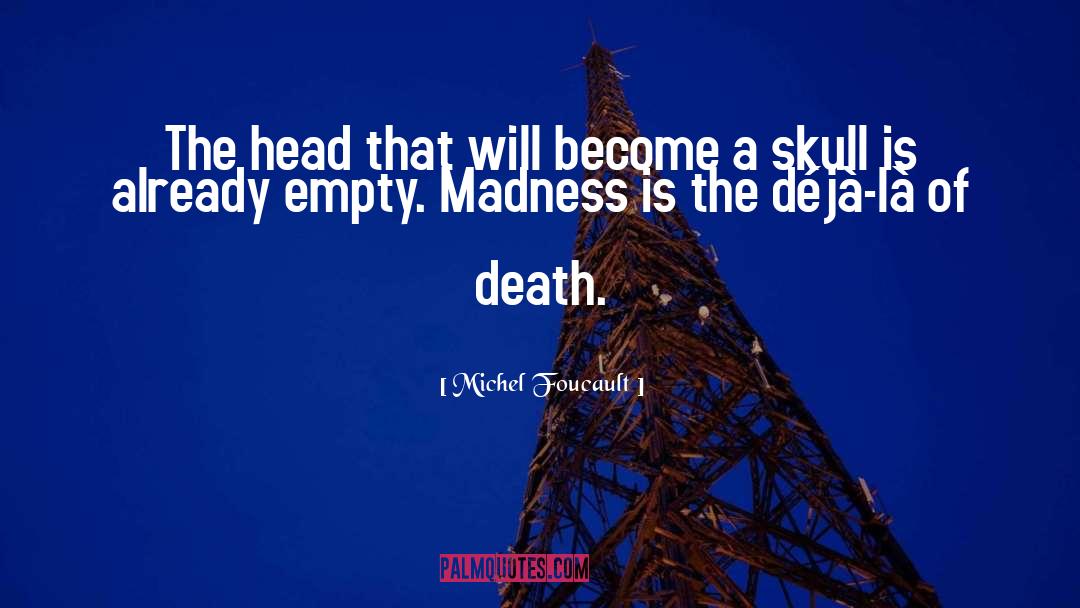
As for what motivated me, it is quite simple; I would hope that in the eyes of some people it might be sufficient in itself. It was curiosity – the only kind of curiosity, in any case, that is worth acting upon with a degree of obstinacy: not the curiosity that seeks to assimilate what it is proper for one to know, but that which enables one to get free of oneself. After all, what would be the value of the passion for knowledge if it resulted only in a certain amount of knowledgeableness and not, in one way or another and to the extent possible, in the knower's straying afield of himself? There are times in life when the question of knowing if one can think differently that one thinks, and perceive differently than one sees, is absolutely necessary if one is to go on looking and reflecting at all. People will say, perhaps, that these games with oneself would better be left backstage; or, at best, that they might properly form part of those preliminary exercises that are forgotten once they have served their purpose. But, then, what is philosophy today – philosophical activity, I mean – if it is not the critical work that thought brings to bear on itself? In what does it consist, if not in the endeavour to know how and to what extent it might be possible to think differently, instead of legitimating what is already known?
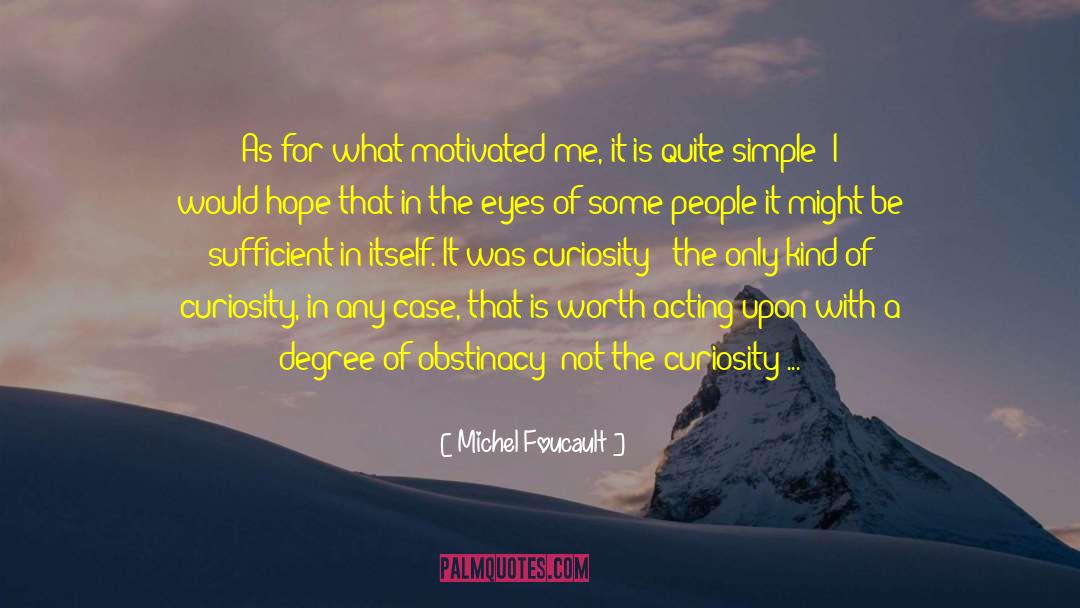
In civilizations without boats, dreams dry up, espionage takes the place of adventure and the police take the place of pirates
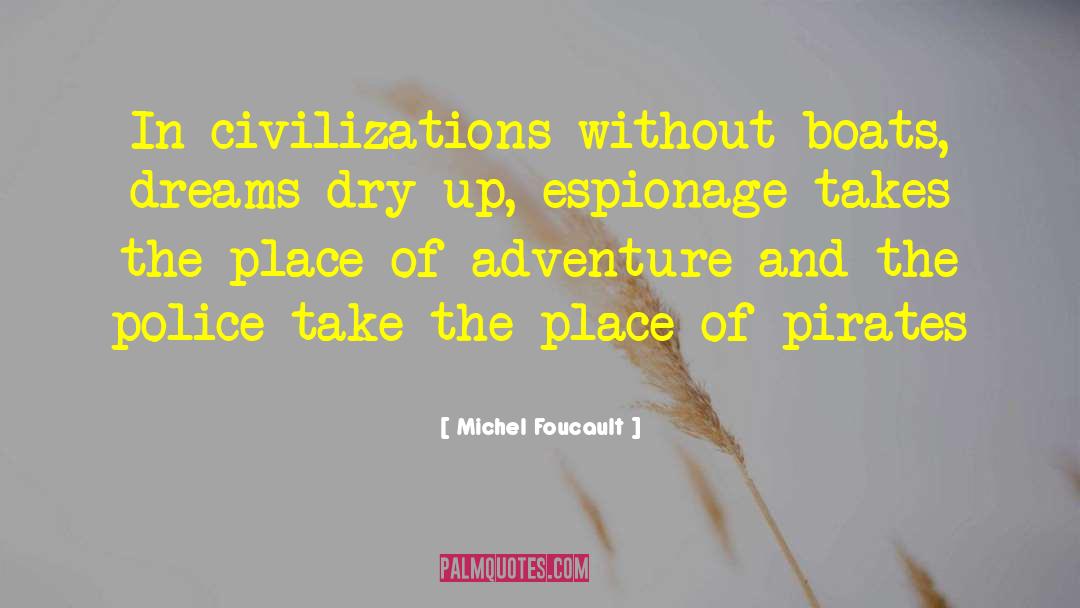
Religion for them [Iranians] was like a promise and guarantee of finding something that would radically change their subjectivity
![Michel Foucault Quotes: Religion for them [Iranians] was Michel Foucault Quotes: Religion for them [Iranians] was](https://palmquotes.com/author/michel-foucault-quotes-1333550.jpg)
Humanity does not gradually progress from combat to combat until it arrives at universal reciprocity, where the rule of law finally replaces warfare; humanity installs each of its violences in a system of rules and thus proceeds from domination to domination. The nature of these rules allows violence to be inflicted on violence and the resurgence of new forces that are sufficiently strong to dominate those in power. Rules are empty in themselves, violent and unfinalized; they are impersonal and can be bent to any purpose. The successes of history belong to those who are capable of seizing these rules, to replace those who had used them, to disguise themselves so as to pervert them, invert their meaning, and redirect them against those who had initially imposed them; controlling this complex mechanism, they will make it function so as to overcome the rulers through their own rules.
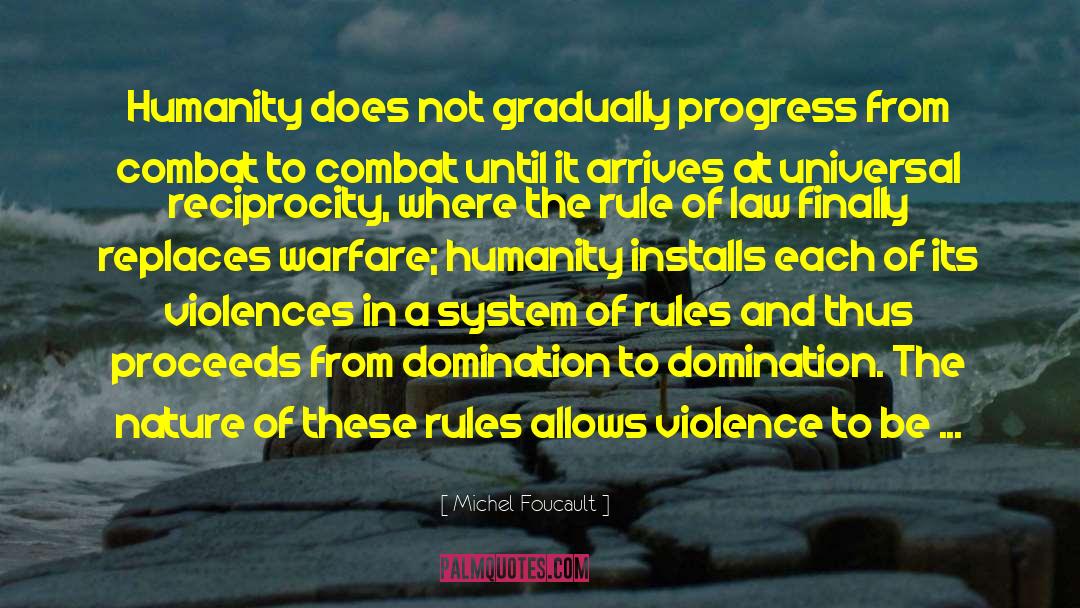
There are moments in life where the question of knowing whether one might think otherwise than one thinks and perceive otherwise than one sees is indispensable if one is to continue to observe or reflect ... What is philosophy today ... if it does not consist in, instead of legitimizing what we already know, undertaking to know how and how far it might be possible to think otherwise?
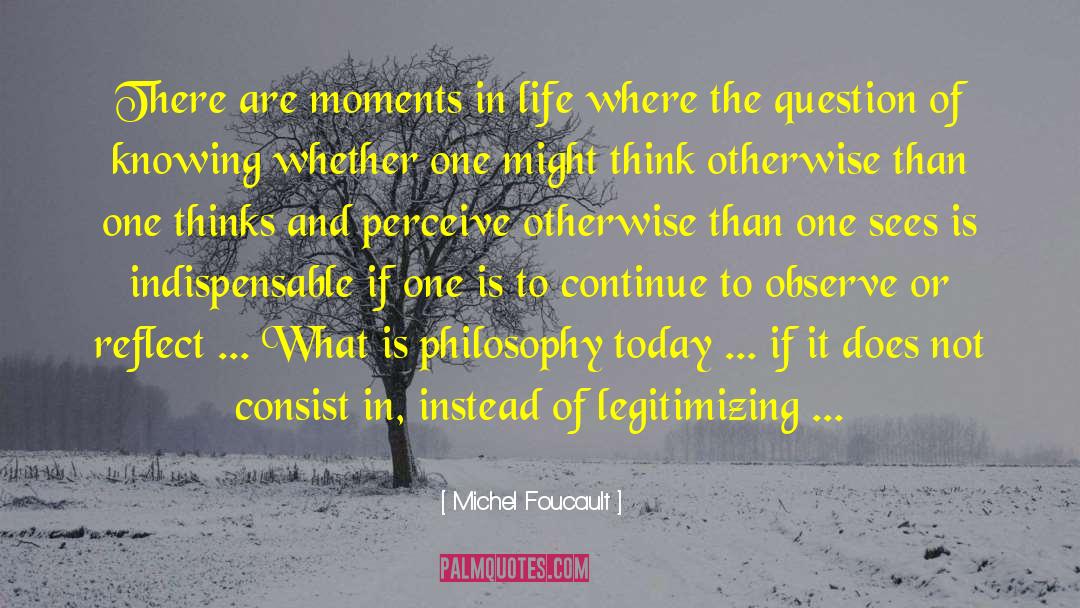
Moreover, it is not entirely without significance that true love was, in Platonic philosophy
but also, as you know, in a whole sector, a whole domain of Christian spirituality and mysticism
the form par excellence of the true life. Since Platonism, true love and the true life have traditionally belonged together, and to a large extend Christian Platonism will take up this theme.
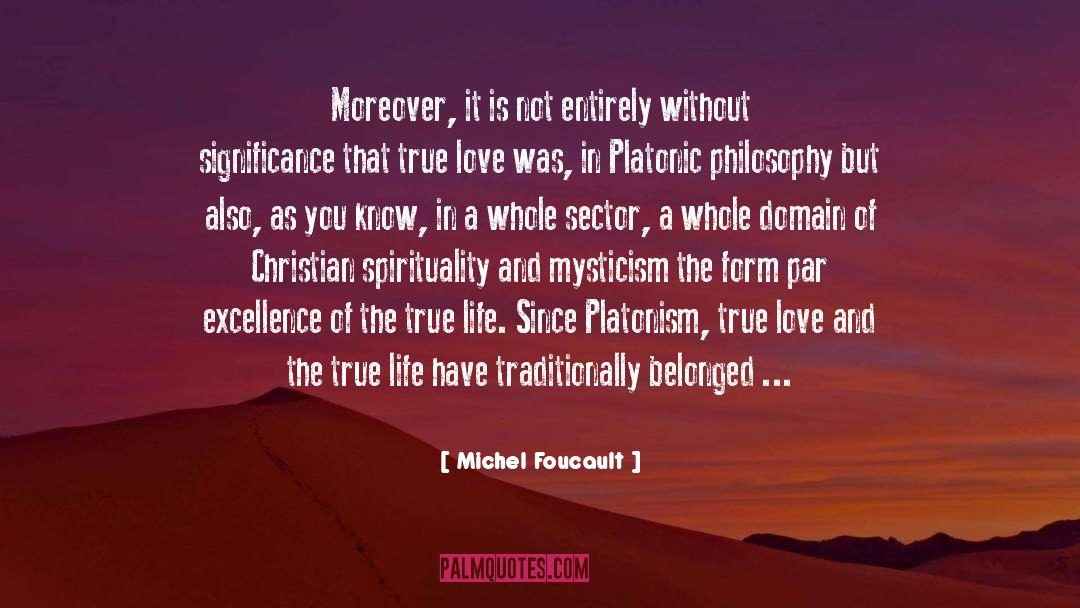
[T]hus one should not think that desire is repressed, for the simple reason that the law is what constitutes both desire and the lack on which it is predicated. Where there is desire, the power relation is already present: an illusion, then, to denounce this relation for a repression exerted after the event.
![Michel Foucault Quotes: [T]hus one should not think Michel Foucault Quotes: [T]hus one should not think](https://palmquotes.com/author/michel-foucault-quotes-414437.jpg)
Freedom of conscience entails more dangers than authority and despotism.
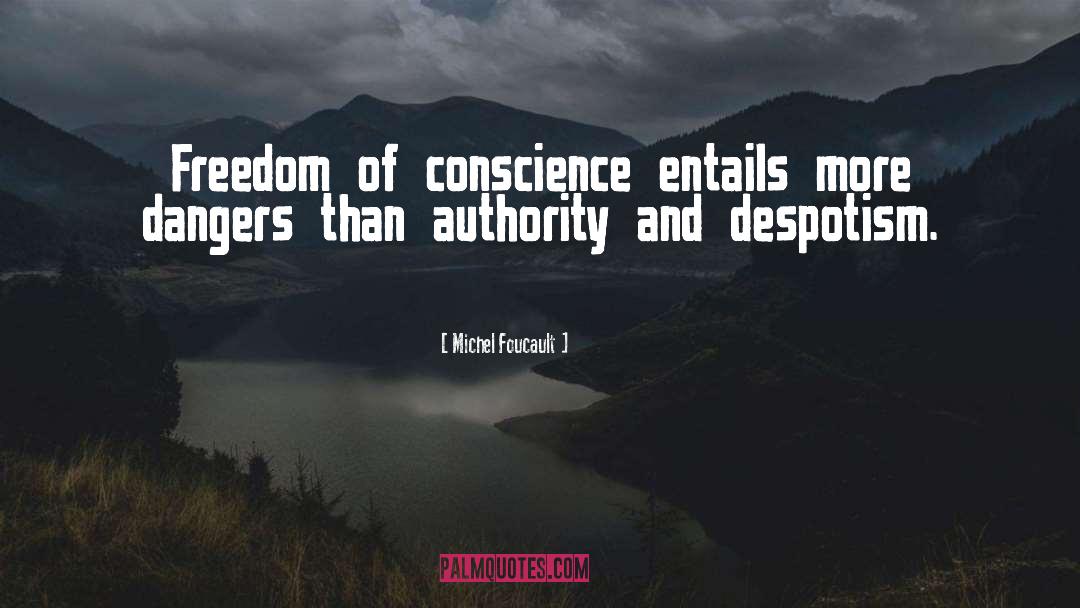
So we must not refer a history of sexuality to the agency of sex; but rather show how "sex" is historically subordinate to sexuality. We must not place sex on the side of reality, and sexuality on that of confused ideas and illusions; sexuality is a very real historical formation; it is what gave rise to the notion of sex, as a speculative element necessary to its operation. We must not think that by saying yes to sex, one says no to power; on the contrary, one tracks along the course laid out by the general deployment of sexuality. It is the agency of sex that we must break away from, if we aim – through a tactical reversal of the various mechanisms of sexuality – to counter the grips of power with the claims of bodies, pleasures, and knowledges, in their multiplicity and their possibility of resistance. The rallying point for the counterattack against the deployment of sexuality ought not to be sex-desire, but bodies and pleasures.
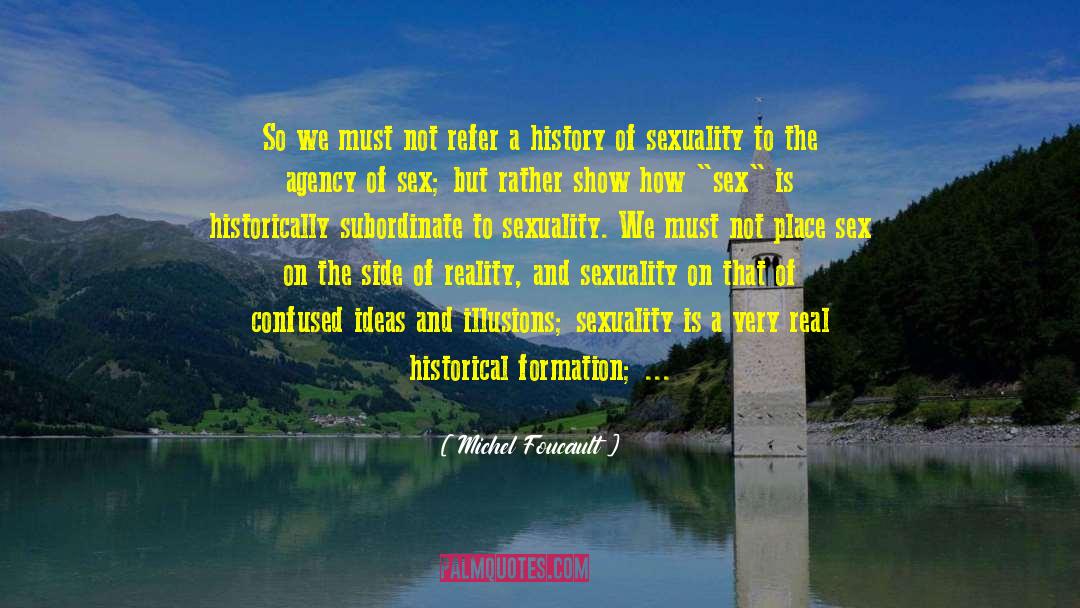
Government is defined as a right manner of disposing things so as to lead not to the form of the common good, as the jurists' texts would have said, but to an end which is 'convenient' for each of the things that are to governed. This implies a plurality of specific aims: for instance, government will have t ensure that the greatest possible quantity of wealth is produced, that the people are provided with sufficient means of subsistence, that the population in enabled to multiply, etc. There is a whole series of specific finalities, then, which become the objective of government as such. In order to achieve these various finalities, things be disposed - and this term, [i] dispose [/i], is important because with sovereignity the instrument that allowed it to achieve its aim - that is to say, obedience to the laws - was the law itself; law and sovereignity were absolutely inseparable.
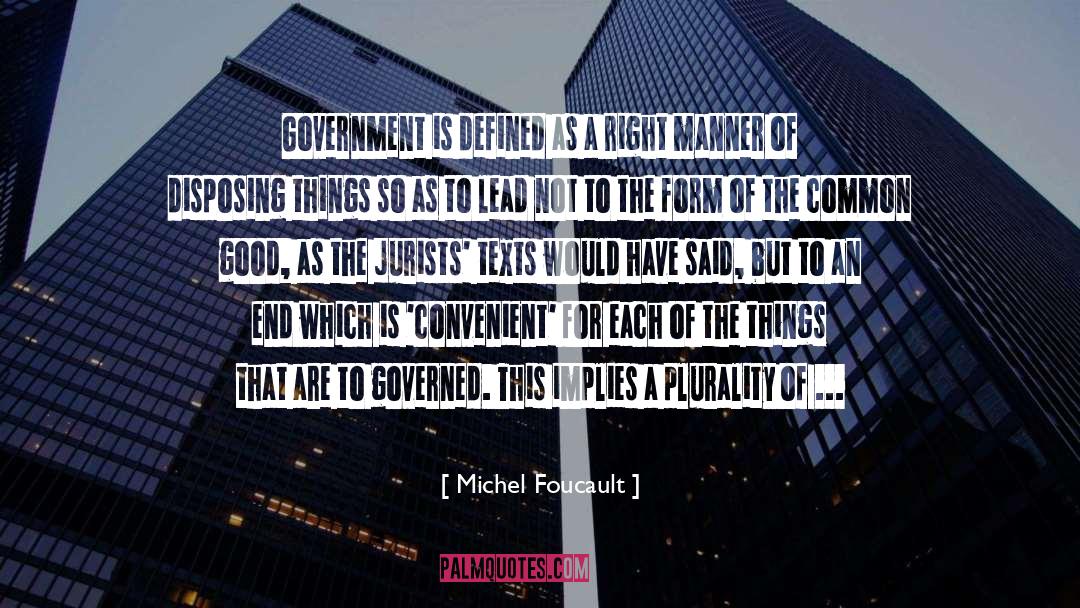
A way of life can be shared among individuals of different ages, status, and social activity. It can yield intense relations not resembling those that are institutionalized. It seems to me that a way of life can yield a culture and an ethics. To be "gay," I think, is not to identify with the psychological traits and the visible masks of the homosexual but to try and define and develop a way of life.
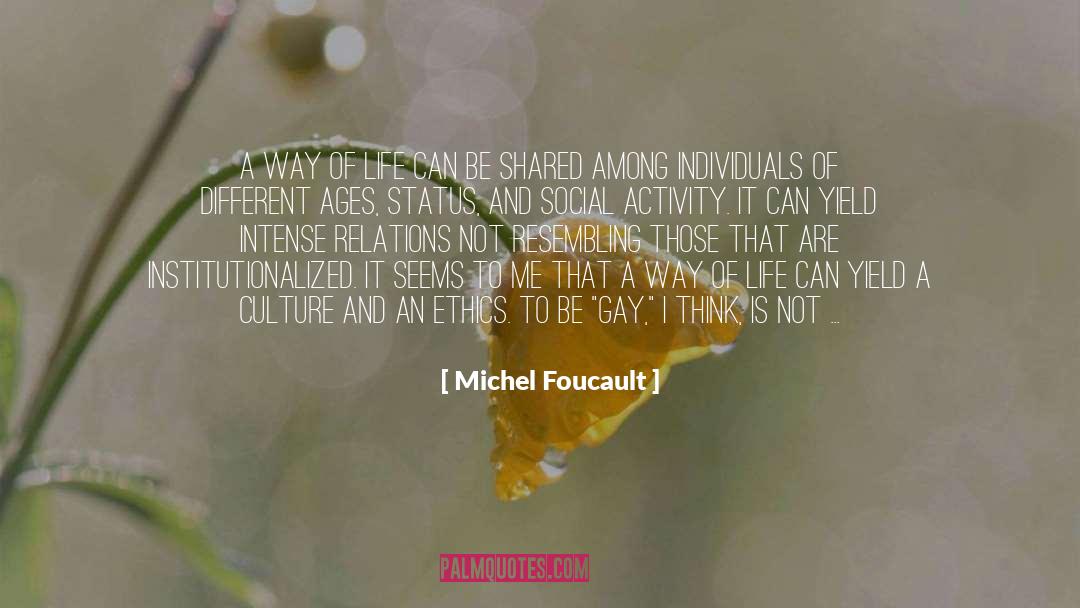
Discourse is not life; its time is not your time; in it, you will not be reconciled to death; you may have killed God beneath the weight of all that you have said; but don't imagine that, with all that you are saying you will make a man that will live longer than he.
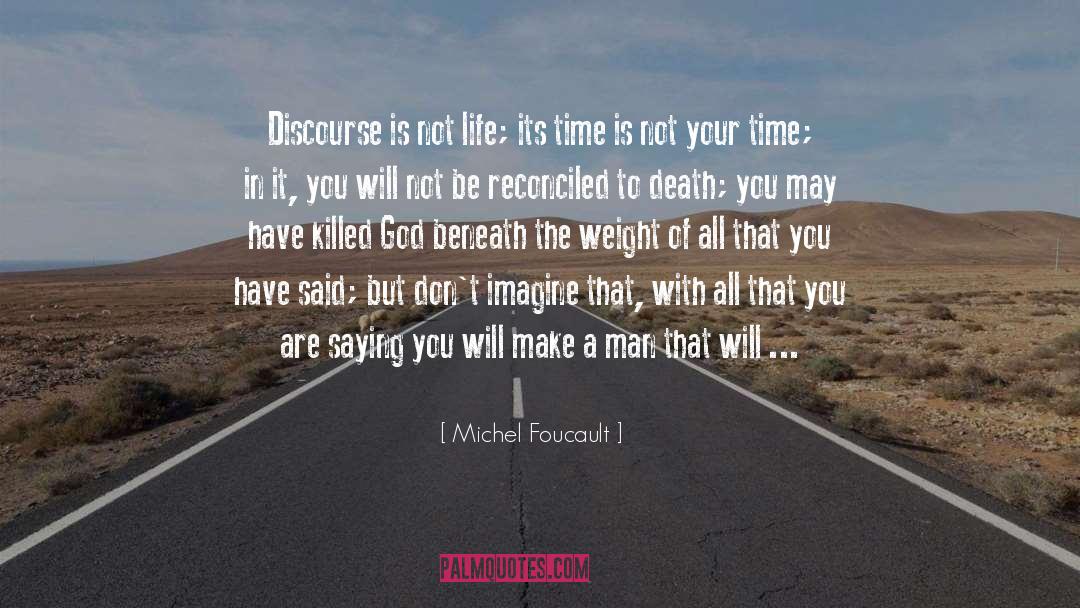
The 'Enlightenment', which discovered the liberties, also invented the disciplines.
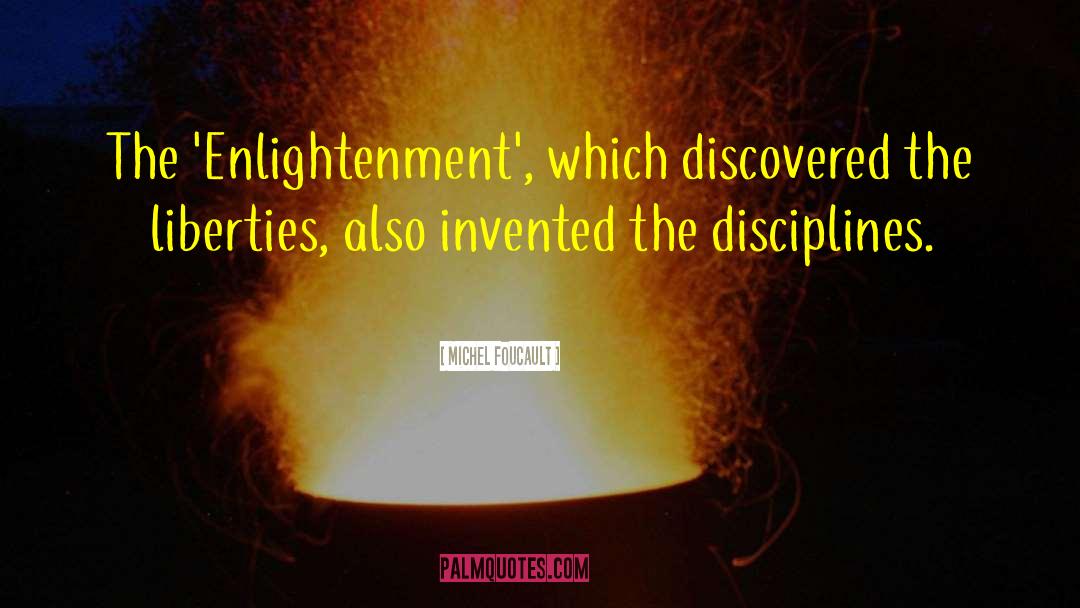
There can only be a true life as an other life, and it's from the point of view of this other life that the ordinary life of ordinary people will be made to appear as precisely other than the true. I live in an other way, and through the very alterity of my life, I show you that what you are looking for is elsewhere than where you are looking, that the road you are taking is an other road than the one you should be taking.
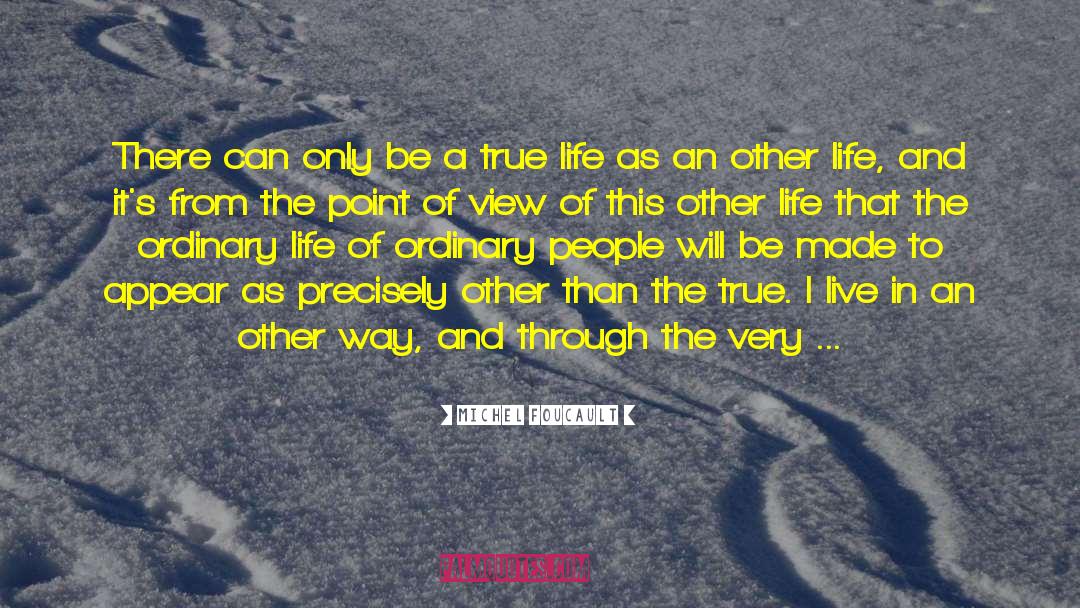
During the years 1945-1965 (I am referring to Europe), there was a certain way of thinking correctly, a certain style of politicaldiscourse, a certain ethics of the intellectual. One had to be on familiar terms with Marx, not let one's dreams stray too far from Freud ... These were therequirements that made the strange occupation of writing and speaking a measure of truth about oneself and one's time acceptable.
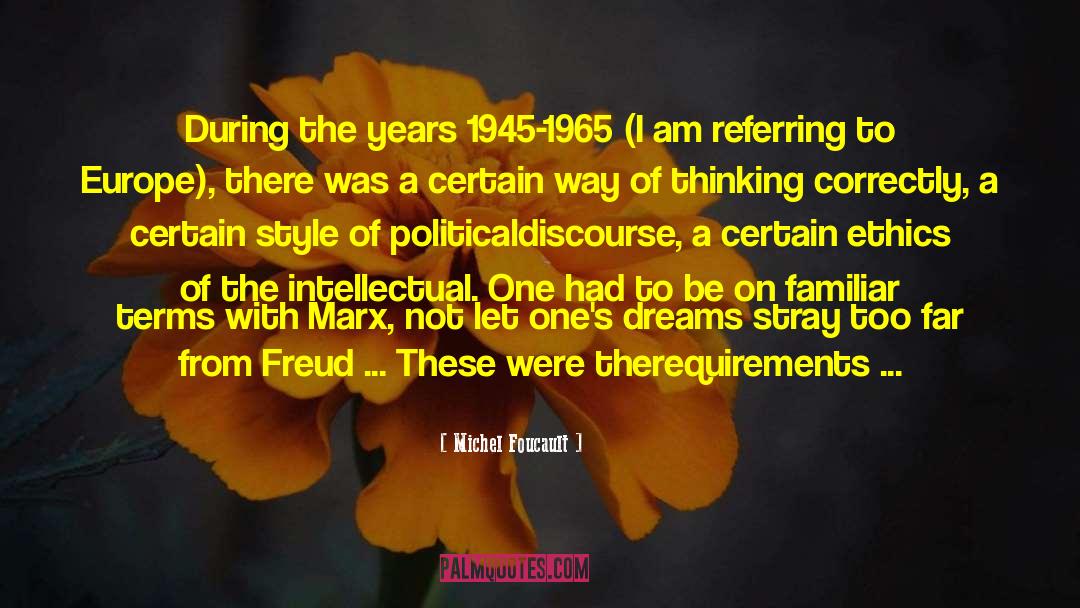
The judges of normality are present everywhere. We are in the society of the teacher-judge, the doctor-judge, the educator-judge, the social worker-judge; it is on them that the universal reign of the normative is based; and each individual, wherever he may find himself, subjects to it his body, his gestures, his behavior, his aptitudes, his achievements.
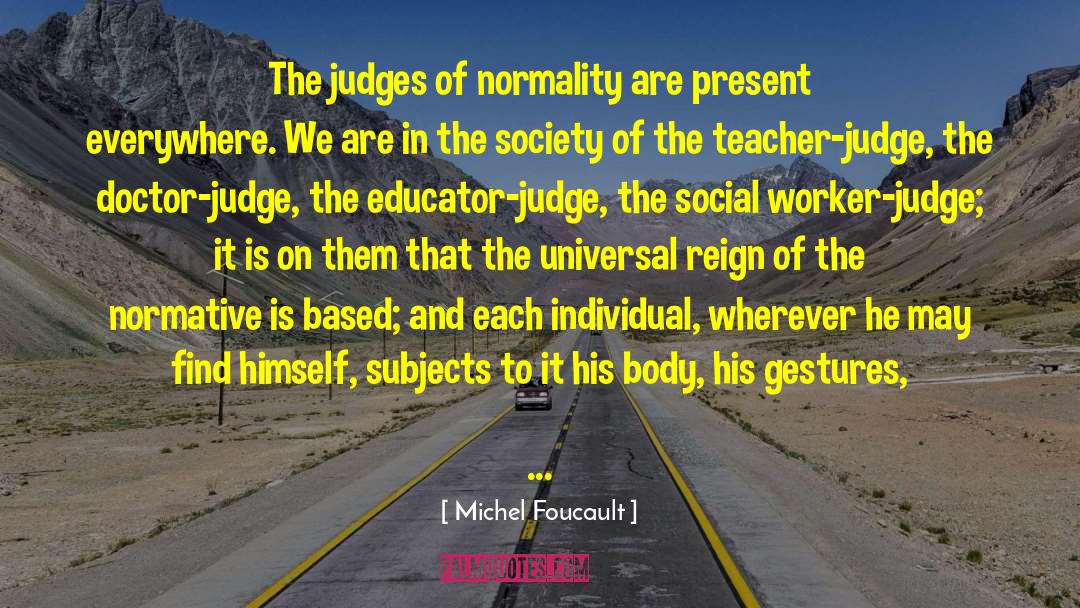
A utopia of judicial reticence: take away life, but prevent the patient from feeling it; deprive the prisoner of all rights, but do not inflict pain; impose penalties free of all pain. Recourse to psycho-pharmacology and to various physiological 'disconnectors', even if it is temporary, is a logical consequence of this 'non-corporal' penality. The
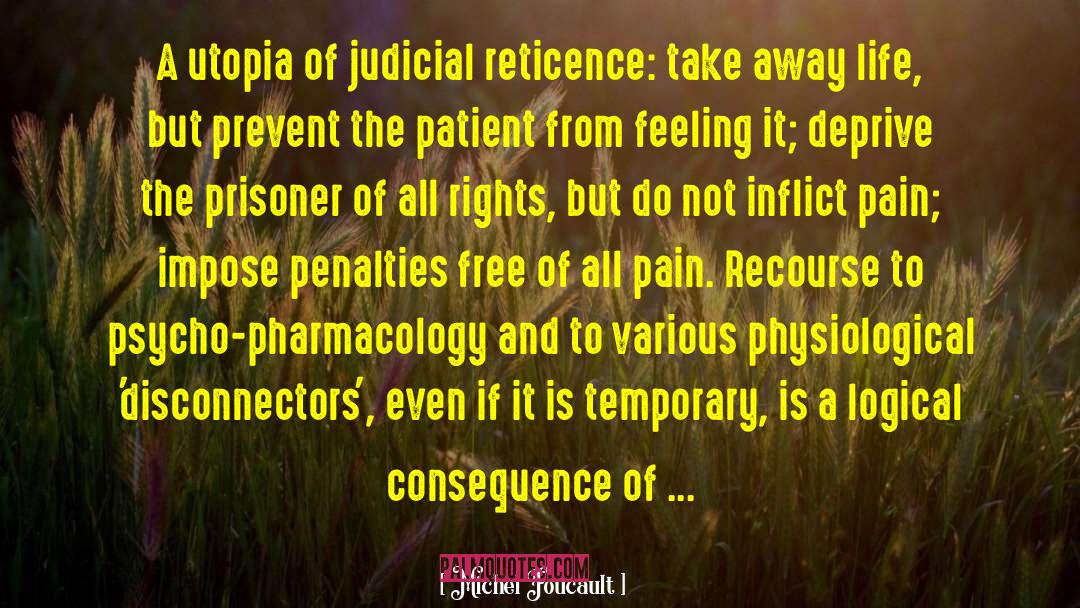
In the serene world of mental illness, modern man no longer communicates with the madman: on one hand, the man of reason delegates the physician to madness, thereby authorizing a relation only through the abstract universality of disease; on the other, the man of madness communicates with society only by the intermediary of an equally abstract reason which is order, physical and moral constraint, the anonymous pressure of the group, the requirements of conformity.
